All-In with Chamath, Jason, Sacks & Friedberg • All-In Podcast, LLC

Episodes

ICE Chaos in Minneapolis, Clawdbot Takeover, Why the Dollar is Dropping
In this episode of All-In, the hosts examine recent immigration enforcement actions in Minneapolis that led to fatal confrontations between federal agents and protesters, highlighting tensions between local and federal authorities. The discussion explores how changing immigration policies affect political representation and electoral dynamics in the United States.
The hosts also analyze the economic implications of the US dollar's declining value and its connection to post-COVID monetary policies, noting the growing wealth gap and its political ramifications. Their conversation extends to developments in open-source AI, including the emergence of models like Anthropic's Kimmy K 2.5, and addresses both the benefits of AI democratization and associated security concerns that need policy attention.
Jan 30, 2026

The Future of Everything: What CEOs of Circle, CrowdStrike & More See Coming in 2026
In this episode of All-In, CEOs and industry leaders explore major technological developments expected to shape the next few years. The discussion covers the growing role of stablecoins in global finance, with Circle's representatives explaining how these digital currencies are being integrated into traditional banking and business transactions. The conversation also examines the infrastructure requirements for advancing AI technology, including innovative approaches to data center development and energy solutions.
The participants delve into the practical challenges and opportunities in building the foundation for future technologies. Topics include the development of specialized computing facilities powered by various energy sources, from natural gas to nuclear, and the potential adaptation of existing infrastructure for new transportation technologies like EVTOL aircraft. The discussion emphasizes how these developments in cryptocurrency, AI, and infrastructure may influence business operations and daily life by 2026.
Jan 25, 2026
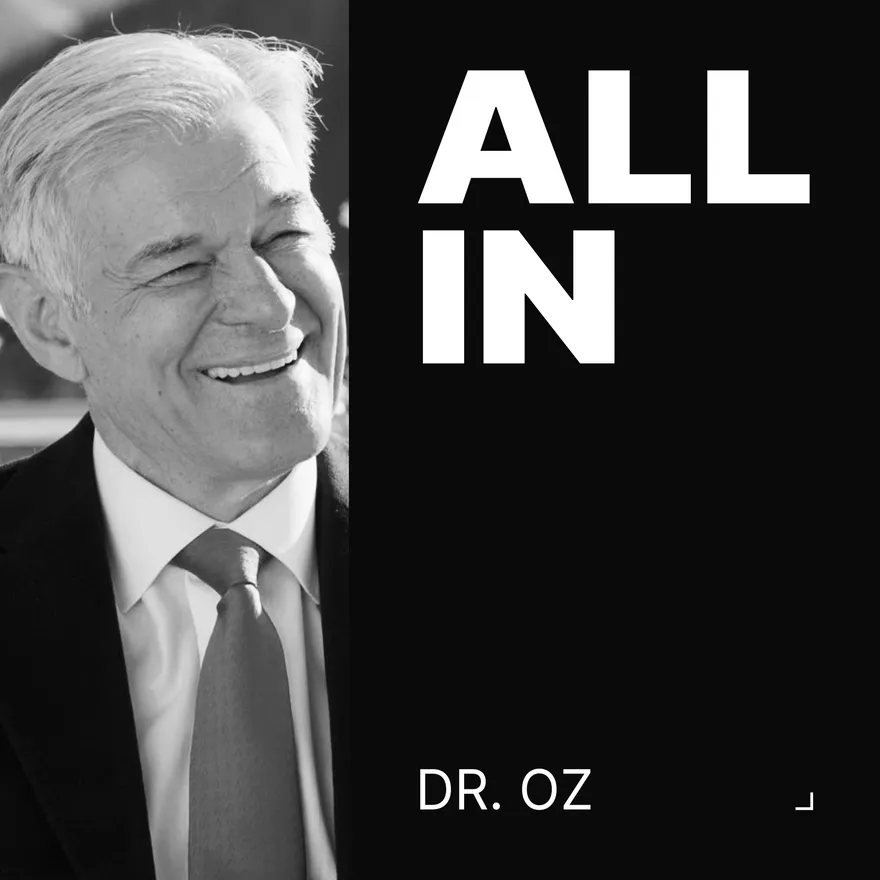
Healthcare Needs Builders, Not Bureaucrats: Dr. Mehmet Oz Live from Davos
In this episode of All-In, Dr. Mehmet Oz discusses how artificial intelligence and technology are transforming healthcare delivery. The conversation explores how AI systems are making doctors more efficient, enabling remote healthcare services, and expanding access to medical care in underserved areas. Dr. Oz explains how large language models are providing medical advice and how AI-supported robots are performing procedures in regions lacking specialists.
The discussion also covers government efforts to improve healthcare accessibility and affordability. Topics include recent drug pricing negotiations with pharmaceutical companies, major investments in rural healthcare infrastructure, and initiatives to combat fraud in government healthcare programs. The conversation examines how the administration is partnering with private-sector companies to enhance healthcare information systems and working to implement data sharing across the healthcare industry.
Jan 24, 2026

Coinbase CEO Brian Armstrong Breaks Down the Three Biggest Trends in Crypto + More from Davos!
In this episode of All-In, tech industry experts examine AI's rapid advancement and its growing infrastructure requirements. The discussion covers how large language models have accelerated AI development beyond initial projections, with specific examples of AI completing complex tasks in seconds and the significant investments required for AI hardware development, including wafer scale engines and cloud computing resources.
The conversation extends to AI's broader implications across society, from its integration into manufacturing processes to its potential impact on employment. The experts explore the global competition for AI supremacy between nations, particularly focusing on China's investments in AI research and chip manufacturing. They also address the societal challenges of job displacement and the need for collaborative governance frameworks as AI automation transforms various industries.
Jan 23, 2026

Inside America's AI Strategy: Infrastructure, Regulation, and Global Competition
In this episode of All-In, the hosts examine the United States' efforts to maintain its position as a global leader in artificial intelligence. The discussion covers the U.S. government's AI strategy under the Trump administration, including plans for national regulations and infrastructure development. The hosts explore how data centers, energy requirements, and technological innovation factor into the competition between the U.S. and China.
The conversation delves into AI's impact on software development, scientific research, and technological independence. Drawing from Stanford research, the hosts discuss the contrasting views on AI between American and Chinese populations, and how these attitudes could affect each nation's regulatory approach and competitive position. The summary highlights current U.S. advantages in AI models, chips, and semiconductor equipment, while noting China's push to develop domestic capabilities.
Jan 23, 2026
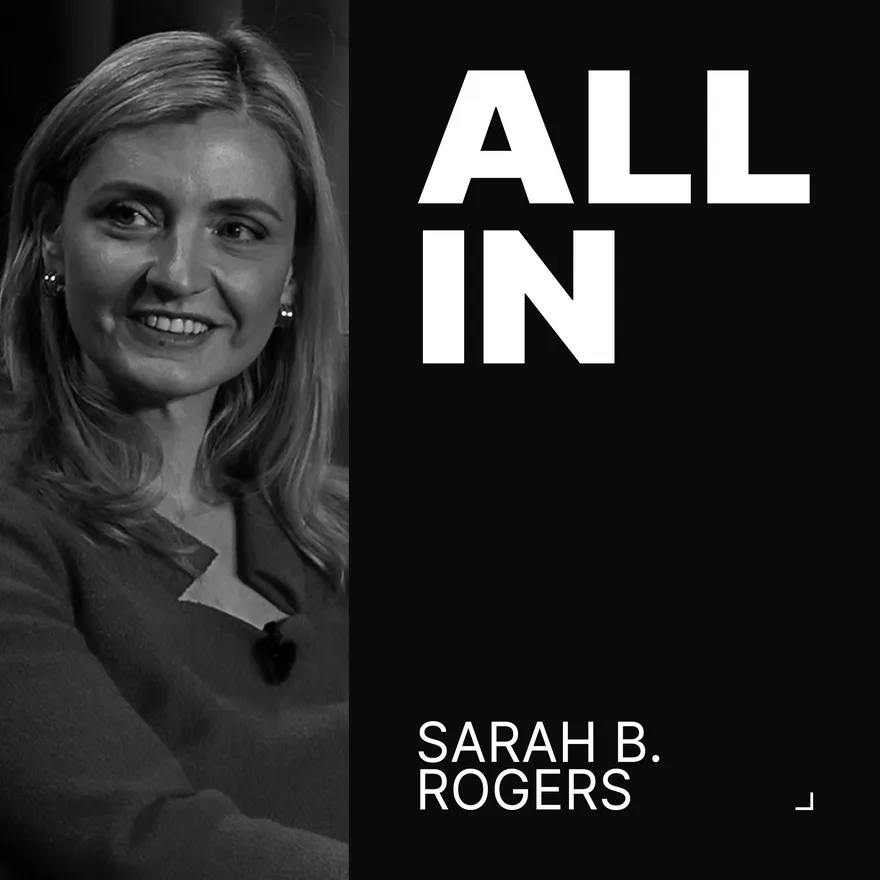
Under Secretary of State Sarah B. Rogers on dismantling the "Censorship Industrial Complex"
In this episode of All-In, Sarah B. Rogers joins Jason Calacanis and David Sacks to examine the differences between US and European approaches to free speech regulation. The discussion covers recent European legislation like the Digital Services Act and its impact on American tech companies, along with how governments use indirect methods to influence content moderation despite First Amendment protections.
The panel explores how the definition of "disinformation" has evolved and its implications for content moderation on tech platforms. They analyze emerging solutions for managing online content, including AI-powered fact-checking tools and community-driven moderation systems, with particular attention to how these approaches can bridge divides between opposing viewpoints while maintaining free speech principles.
Jan 22, 2026
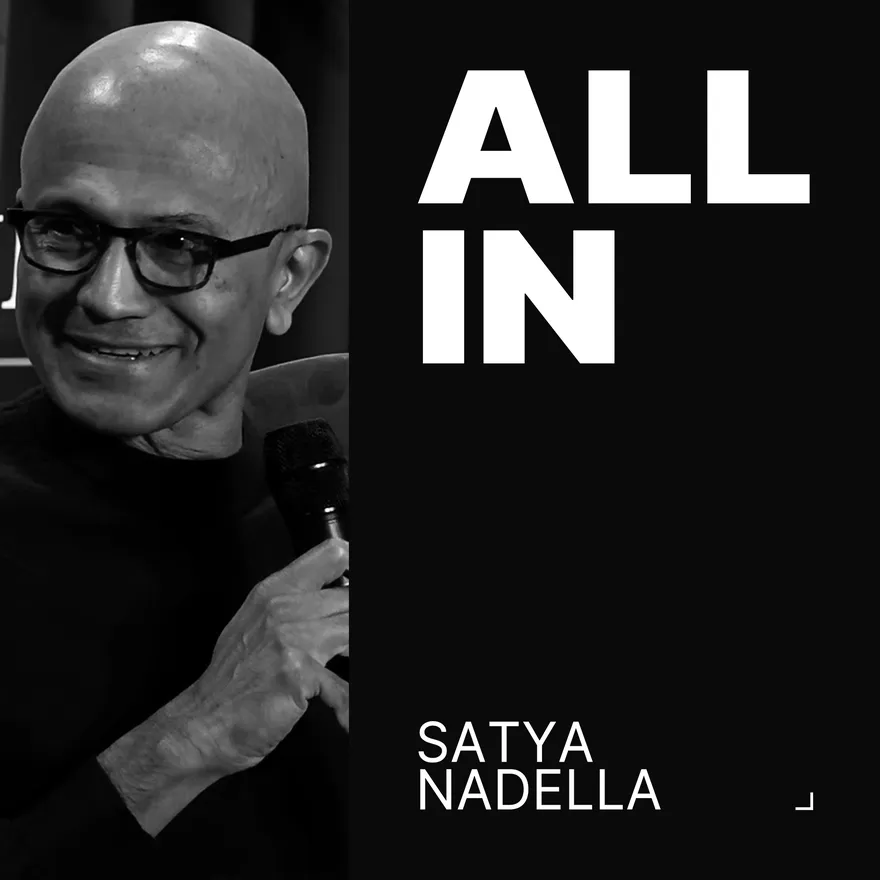
Microsoft CEO Satya Nadella on AI's Business Revolution: What Happens to SaaS, OpenAI, and Microsoft? | LIVE from Davos
In this episode of All-In, Microsoft CEO Satya Nadella discusses the company's plans to integrate AI across its product suite. He outlines how Microsoft is developing AI-driven tools, including chatbots and autonomous agents, that will work both locally and in the cloud. The discussion covers how these AI entities will receive digital identities similar to human users and explains the concept of "infinite minds," where AI agents handle larger tasks while humans provide oversight.
Nadella also explores how AI is reshaping the nature of knowledge work, pointing to changes in traditional roles and the increasing importance of workforce reskilling. The conversation extends to the global impact of AI technology, drawing parallels to the Industrial Revolution and examining how AI adoption could drive economic growth, particularly in the Global South where it could improve public sector services.
Jan 21, 2026

Iran's Breaking Point, Trump's Greenland Acquisition, Solving Energy Costs, Billionaire Tax Backlash
In this episode of All-In, the hosts explore several international and domestic policy issues. They examine Iran's current economic crisis, where the average monthly income of $200 combined with high food costs has created significant strain on the population. The discussion also covers the strategic importance of Greenland, particularly as Arctic ice melts, creating new shipping lanes and access to valuable resources.
The conversation shifts to domestic matters, focusing on California's proposed Billionaires' Tax Act and its potential impact on business leaders in the state. The hosts analyze California's tax revenue and public spending, with particular attention to the state's pension system and the influence of public sector unions. They discuss how these factors affect the state's fiscal health and public services.
Jan 17, 2026
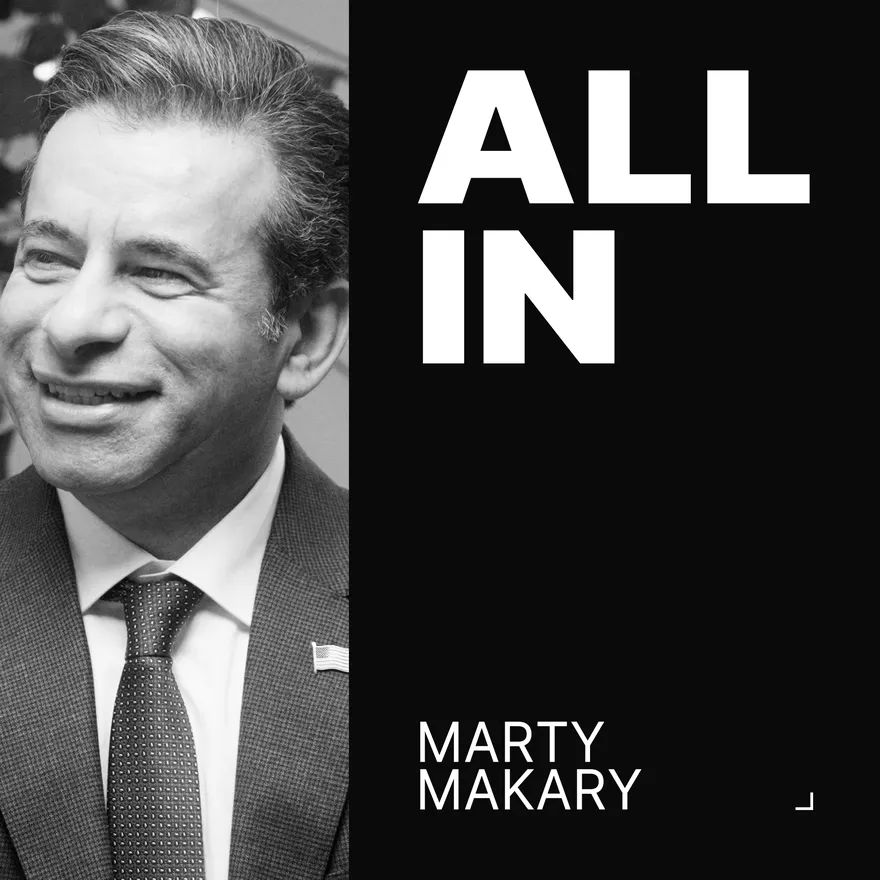
Can We Trust the FDA? Marty Makary on Science, Power & Patients
In this episode of All-In, Marty Makary discusses his first 10 months as FDA Commissioner and the 42 major reforms he has introduced to modernize the agency. The changes include reducing animal testing, streamlining drug approval processes, and implementing advanced computational modeling. Makary also addresses the FDA's efforts to increase transparency by making rejection letters public and taking action on artificial food dyes.
The discussion covers the FDA's approach to improving U.S. competitiveness in biotech and biopharma, noting China's growing influence in licensing deals. Makary explains his work to rebuild trust in health institutions through more flexible decision-making, including changes to childhood vaccine schedules and dietary guidelines. He details the FDA's new initiatives in food policy and nutrition, challenging traditional perspectives on protein requirements and saturated fats.
Jan 15, 2026

Adam Carolla on California's Collapse: Fires, Failed Leadership, and Gyno-Fascism
In this episode of All-In, Adam Carolla and David Friedberg examine California's current challenges, from its complex regulatory landscape to its economic difficulties. They discuss how the state's restrictive building regulations and lengthy permitting processes affect post-disaster reconstruction, and explore the growing ideological divisions within California that are influencing migration patterns to other states.
The conversation covers California's financial outlook, including its projected budget deficit and potential pension shortfall, while noting the departure of wealthy individuals and businesses to more business-friendly states. The discussion also examines changes in media coverage, particularly focusing on how newsroom demographics may influence reporting styles and the practice of political endorsements by major newspapers.
Jan 13, 2026

All-In's 2026 Predictions
In this episode of All-In, the hosts examine California's proposed 5% wealth tax on high-net-worth individuals and its potential impact on the state's business landscape. The panel discusses how this policy could affect tech industry leaders and explores the growing tensions between technology companies and conservative politicians over content moderation practices.
The conversation then turns to economic and political predictions for 2026. The hosts share GDP growth forecasts ranging from 4.6% to 6.2%, citing AI advancement and potential tax reforms as key drivers. They also discuss expected shifts in U.S. political dynamics, including changes within the Democratic Party, and outline possible developments in international relations, particularly regarding Iran and U.S. foreign policy approaches.
Jan 10, 2026
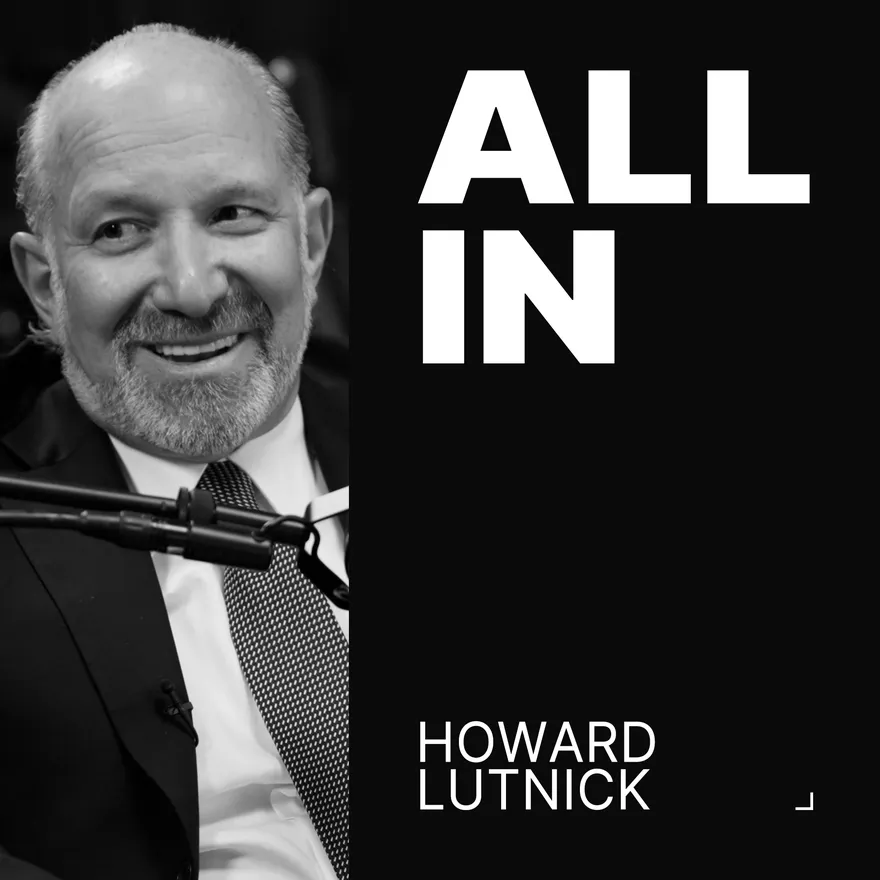
Howard Lutnick: How America Can Hit 6% GDP Growth in 2026
In this episode of All-In, Howard Lutnick outlines his approach to government reform, explaining the changes he's implemented as Cabinet Secretary. Lutnick describes his efforts to streamline operations, including reducing department personnel and eliminating outdated programs, while sharing his strategies for engaging directly with bureau employees through town halls and office visits.
The discussion covers the administration's economic policies and goals, including their use of tariffs to address trade deficits and their push to boost domestic manufacturing, particularly in semiconductors. Lutnick also details plans to combat government benefits fraud through data analysis and describes how initiatives like the CHIPS Act and renewed focus on vocational education could contribute to projected GDP growth rates of 5-6%.
Jan 9, 2026
Create Summaries for anything on the web
Download the Shortform Chrome extension for your browser


Why AI will dwarf every tech revolution before it: robots, manufacturing, AR glasses from CES 2026
In this episode of All-In, the hosts discuss how AI technology is reshaping industries and workplaces. The conversation examines AI's unprecedented impact compared to previous technological revolutions, with specific examples from companies like McKinsey and Stripe showing how AI integration is changing traditional business operations and accelerating company growth.
The discussion extends to broader implications for the future workforce, including the need for workers to develop skills that complement rather than compete with AI. The hosts explore potential solutions for adapting to these changes, from restructuring organizational hierarchies to implementing new educational models that support continuous learning throughout workers' careers.
Jan 8, 2026

Massive Somali Fraud in Minnesota with Nick Shirley, California Asset Seizure, $20B Groq-Nvidia Deal
In this episode of All-In, investigative journalist Nick Shirley and David Sacks examine the details of major fraud cases in Minnesota involving public funds. The discussion covers several entitlement fraud schemes uncovered by federal prosecutors since 2018, including the misappropriation of funds from child nutrition programs, autism services, and Medicaid disability funds, totaling billions of dollars.
The conversation explores the demographic patterns among those charged in these cases and the political dynamics that may influence how officials address the fraud. Shirley shares insights from his investigative work, including footage of fraudulent daycare centers, while the hosts discuss the role of citizen journalism in bringing these issues to national attention when traditional media outlets were slow to report on them.
Dec 31, 2025

All-In x Kill Tony: A Hilarious Holiday Special
In this special episode of All-In, comedian Tony Hinchcliffe joins the hosts to discuss the business side of comedy and his journey with his show "Kill Tony." From sleeping on couches to selling out Madison Square Garden, Hinchcliffe shares insights about independent content creation, his Netflix deal, and YouTube success, while explaining how major studios approach risk in comedy.
The episode features an exchange of roasts between Hinchcliffe and the All-In hosts, with both sides trading humorous jabs about wealth and personality quirks. The conversation also touches on comedy's role in addressing political topics, with Hinchcliffe explaining his approach to political material and the hosts discussing current challenges to free speech in comedy, particularly in Europe.
Dec 24, 2025
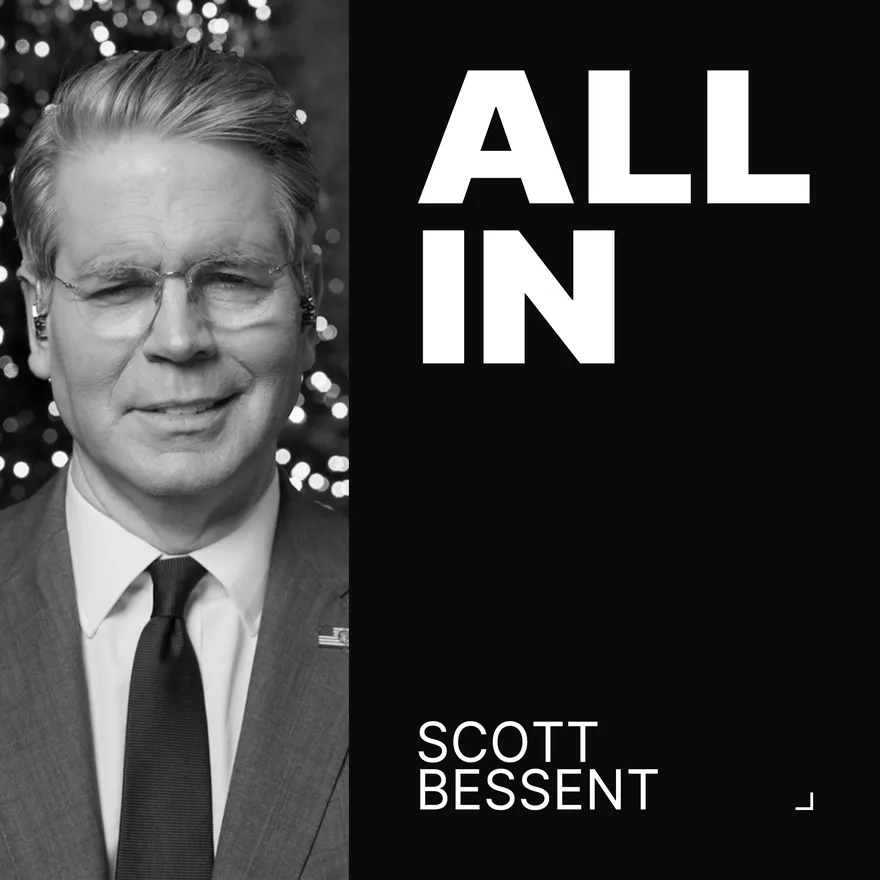
Scott Bessent: Fixing the Fed, Tariffs for National Security, Solving Affordability in 2026
In this episode of All-In, Scott Bessent examines current economic policies and their effects on the U.S. economy. He discusses the expected fiscal contraction and changes in the federal budget deficit, while explaining how tariffs have transformed from a controversial measure into a key fiscal tool for managing trade relationships, particularly with countries like China and Vietnam.
The discussion covers the Federal Reserve's expanding role beyond traditional interest rate management and its impact on economic inequality through policies like quantitative easing. Bessent also outlines the administration's future economic plans, including tax cuts and regulatory changes aimed at increasing capital expenditure, as well as a new initiative called "Trump Accounts" designed to boost financial literacy and economic participation among Americans.
Dec 22, 2025

Bernie Sanders: Stop All AI, China's EUV Breakthrough, Inflation Down, Golden Age in 2026?
In this episode of All-In, the hosts examine current debates surrounding artificial intelligence development and its societal impact. The discussion covers Bernie Sanders' recent call to halt AI data centers, contrasting it with studies showing positive job and wage growth in AI-exposed occupations. The hosts also address concerns about AI's effects on children's social development and explore the distinctions between social media's impact and AI's educational potential.
The conversation then shifts to the global AI landscape, particularly the technological competition between the US and China. The hosts analyze China's substantial investments in chip technology and research advances, while examining the implications for US national security and economic leadership. The episode concludes with a discussion of how the tech industry can better communicate AI's benefits to the public and build trust through community-focused initiatives.
Dec 19, 2025

Tucker Carlson: Rise of Nick Fuentes, Paramount vs. Netflix, Anti-AI Sentiment, Hottest Takes
In this episode of All-In, Tucker Carlson joins the hosts to examine artificial intelligence's influence on employment and civil liberties. The group discusses AI's potential impact on job displacement across various sectors, from entry-level positions to skilled professions, while debating the timeline and extent of these changes. They also address concerns about AI's role in government surveillance and the need for protective guidelines.
The conversation extends to other significant topics, including a potential major media merger involving Warner Bros, Netflix, and Paramount, along with its implications for industry competition. The hosts also explore the growth of nationalist movements, examining economic factors that contribute to their appeal and discussing approaches to maintaining social cohesion in America.
Dec 13, 2025

OpenAI's Code Red, Sacks vs New York Times, New Poverty Line?
The All-In podcast co-hosts explore the current state of competition in the AI market, examining how major tech companies are vying for dominance. The discussion covers OpenAI's declining market share, Google's integration of Gemini AI into its search platform, and Meta's strategy of leveraging existing distribution channels. The hosts analyze how established tech giants might use their resources and distribution capabilities to gain advantages in the AI race.
The conversation also addresses broader implications of the evolving AI landscape, including concerns about potential market monopolization and the ongoing US-China competition in AI development. The hosts examine how different approaches to AI development—China's "national champion" model versus the U.S.'s competition-driven market—could shape the industry's future, while considering AI's impact on job markets and economic inequality.
Dec 6, 2025

Molly's Game Uncensored: The Truth Behind the World's Most Infamous Poker Game
In this episode of All-In, Molly Bloom shares her journey from serving drinks at celebrity poker games to running her own high-stakes gambling operations. She describes how a $4,000 tip sparked her entry into the world of exclusive poker, leading her to study the game and eventually create sophisticated gambling experiences with buy-ins up to $50,000.
The conversation covers the challenges Bloom faced while managing wealthy players and their complex dynamics, including substantial financial losses she absorbed to maintain trust. She also discusses her encounters with organized crime, her eventual arrest, and her path to writing a memoir that became a successful film. The episode concludes with Bloom's current work advising others on presence and emotional intelligence, drawing from her experiences in the high-stakes poker world.
Nov 26, 2025

Epstein Files Fallout, Nvidia Risks, Burry's Bad Bet, Google's Breakthrough, Tether's Boom
In this episode of All-In, the hosts explore several developments in technology and finance. The discussion covers Tether's growth as a stablecoin provider, including its user base expansion and investment strategies, along with the regulatory hurdles it faces. The hosts also examine the potential impact of AI-designed chips on NVIDIA's market position and consider the upcoming release of Epstein-related documents following a bipartisan congressional vote.
The conversation extends to personal investment philosophies, with Chamath Palihapitiya sharing his approach to investing personal capital versus managing venture funds. David Friedberg discusses his transition to leading Ohalo, while poker player Alan Keating offers perspectives on decision-making in high-pressure situations.
Nov 22, 2025

Home Affordability Crisis, Palantir's Advantage, Big Short on AI, H-1B Abuse, Solar Storm Hits Earth
The latest episode of All-In with Chamath, Jason, Sacks & Friedberg examines key challenges in housing affordability and immigration policy. The hosts analyze why first-time homebuyers are now typically in their 40s, exploring how government programs and construction restrictions affect housing prices. They also discuss problems with the H1-B visa system and propose solutions, including visa fee adjustments and auction-based distribution.
The conversation shifts to the impact of solar storms on modern technology. The hosts explore how these astronomical events could disrupt communications and damage infrastructure, drawing parallels to historical incidents like the Carrington event. They consider potential technological adaptations, including a transition from electron-based computing to quantum and photonic systems, as ways to protect against future solar threats.
Nov 14, 2025

Does OpenAI Need a Bailout? Mamdani Wins, Socialism Rising, Filibuster Nuclear Option
In this episode of All-In, the hosts examine AI's impact on the job market and economy, particularly its effects on young workers and income inequality. The discussion covers OpenAI's growth plans and financial performance, with analysis of the company's projected revenues and the broader AI industry's infrastructure needs. The hosts also debate the challenges facing AI development, including regulatory uncertainty and power constraints.
The conversation extends to recent political trends, focusing on the rise of progressive policies in urban areas and changing voter demographics. The hosts explore potential solutions to economic challenges, including student loan reform and housing affordability. They also discuss the need for federal AI regulation, with arguments against state-level oversight and suggestions for streamlining AI development through a unified framework.
Nov 7, 2025

Ari Emanuel on the Future of Entertainment: Hollywood, AI, Creator Economy, YouTube vs Netflix
In this episode of All-In, Ari Emanuel discusses the evolution and future of the entertainment industry. As founder of Endeavor, Emanuel shares how the company grew from a startup agency to a major entertainment corporation through strategic acquisitions of William Morris, IMG, UFC, and other properties. He explains how traditional content distribution has transformed into a decentralized ecosystem where streaming platforms compete for content and creators have direct access to audiences.
Emanuel also explores emerging trends in entertainment, including his prediction of increased demand for live events due to changing work patterns. The discussion covers how sports leagues are adapting to new consumer preferences, and touches on the potential impact of emerging technologies in live entertainment—including the possibility of integrating robotics into events like UFC matches.
Nov 5, 2025
Create Summaries for anything on the web
Download the Shortform Chrome extension for your browser

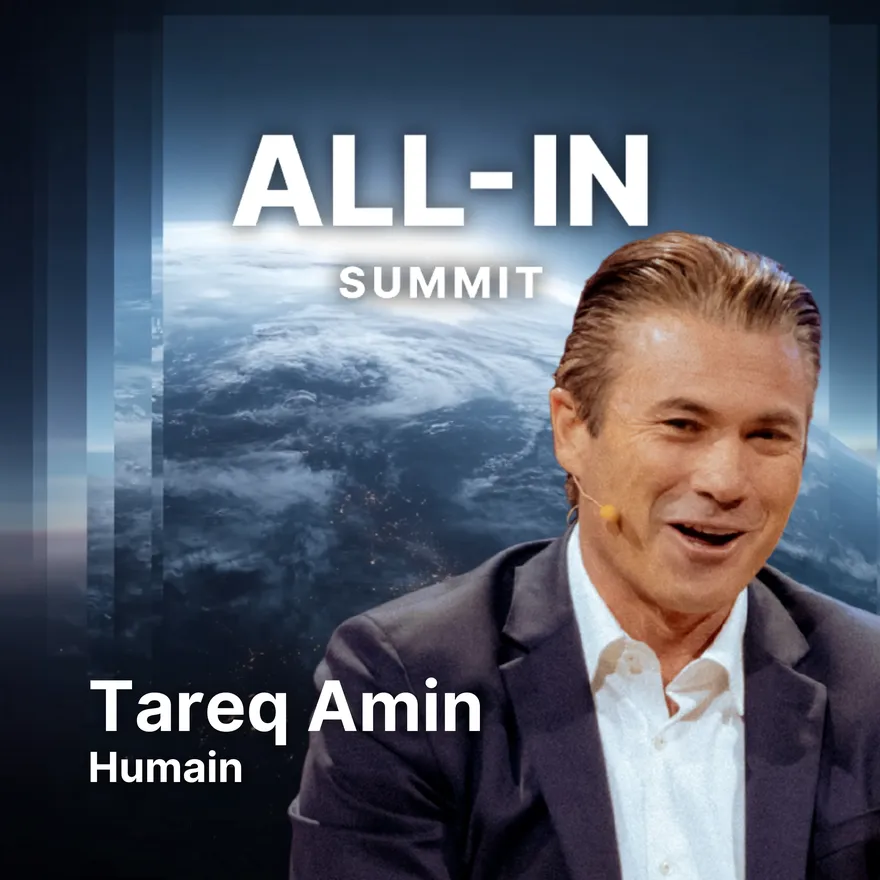
Inside Saudi Arabia's AI Ambition: Tareq Amin on Building a New Tech Superpower
In this episode of All-In, tech industry veteran Tareq Amin discusses Saudi Arabia's push to become a global AI hub. Amin explains his work with Humane, an initiative that aims to unify public and private AI investments in Saudi Arabia, and describes how the country is addressing gaps in its AI infrastructure. He outlines the development of Arabic-specific AI models and an AI operating system for enterprises called "Humane One."
The discussion covers Saudi Arabia's investment in its tech workforce, including the education of Saudi citizens at Western universities who now work as scientists and researchers at Humane. Amin shares his perspective on Saudi Arabia's young, tech-savvy population and describes the challenges of changing organizational mindsets to fully embrace AI capabilities as the country builds its technological future.
Nov 4, 2025
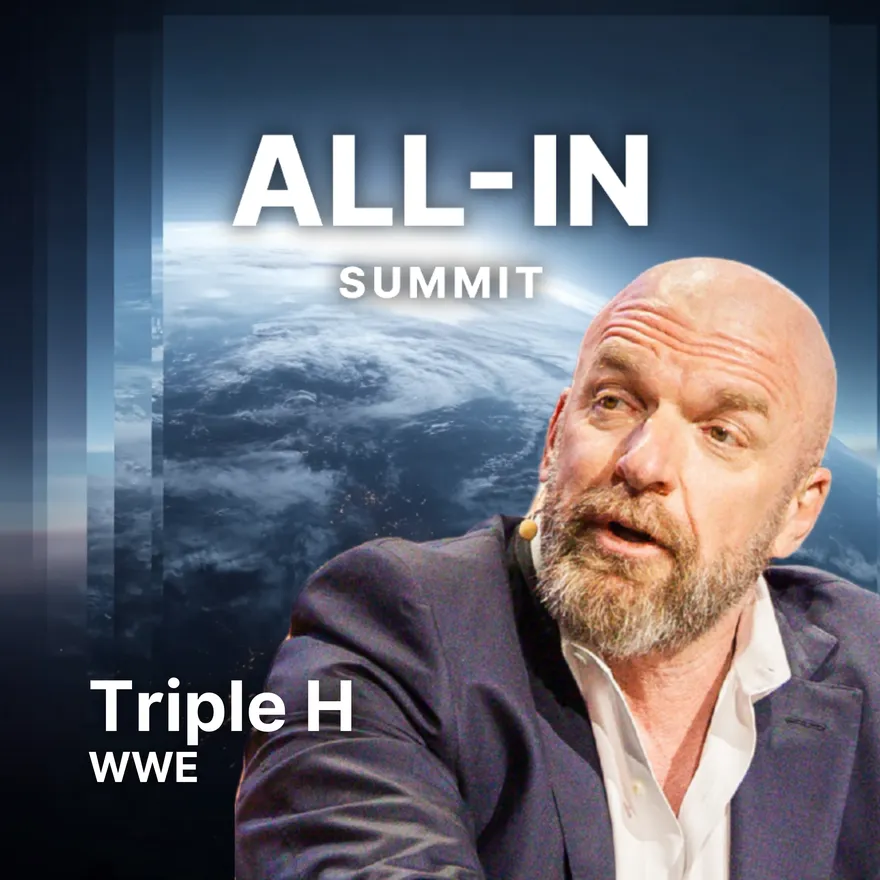
Triple H on WWE's Evolution, the Rise of the Antihero, and the Psychology of Stardom
In this episode of All-In, Paul Levesque (Triple H) and the hosts explore the multifaceted world of professional wrestling, focusing on what it takes to succeed in WWE. The discussion covers how performers must combine athletic ability, acting skills, and charisma to connect with audiences, while also examining how wrestling's storytelling has evolved from simple good-versus-evil narratives to more complex character arcs that reflect modern society.
The conversation delves into WWE's business model, which prioritizes live entertainment while leveraging digital platforms and social media for broader reach. Levesque also discusses how the skills developed in WWE—from physical presence to public engagement—have helped performers transition into other careers, drawing parallels between wrestling stars and political figures who have successfully crossed over into different domains.
Nov 3, 2025
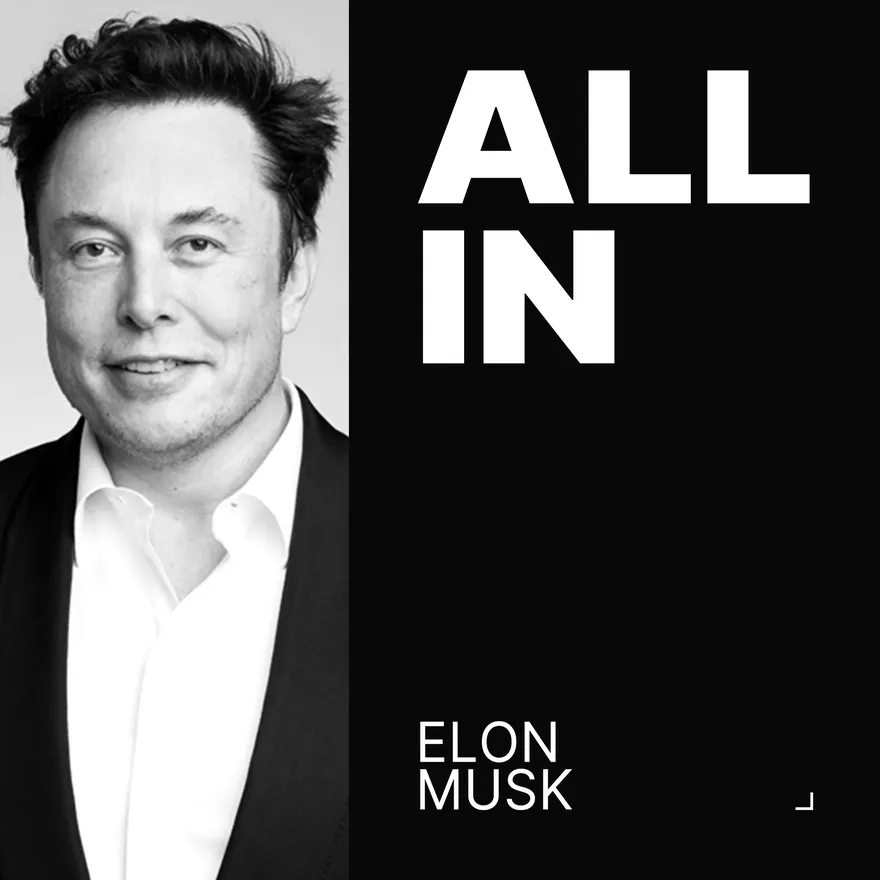
Elon Musk: 3 Years of X, OpenAI Lawsuit, Bill Gates, Grokipedia & The Future of Everything
In this episode of All-In, Elon Musk discusses his three-year journey with Twitter (now X), including changes to content moderation policies and the release of previously hidden platform practices. He also outlines his vision for Grokipedia, an AI-powered alternative to Wikipedia that aims to provide balanced, contextual information through the capabilities of his AI system, Grok.
The discussion extends to Tesla's advancement in autonomous vehicle technology and the future of their self-driving fleet. Musk also addresses global energy challenges, examining solar power's potential to meet worldwide energy demands and responding to criticism about renewable energy feasibility. The conversation covers current solar panel efficiency, manufacturing capabilities, and the relationship between fossil fuel subsidies and renewable energy adoption.
Oct 31, 2025
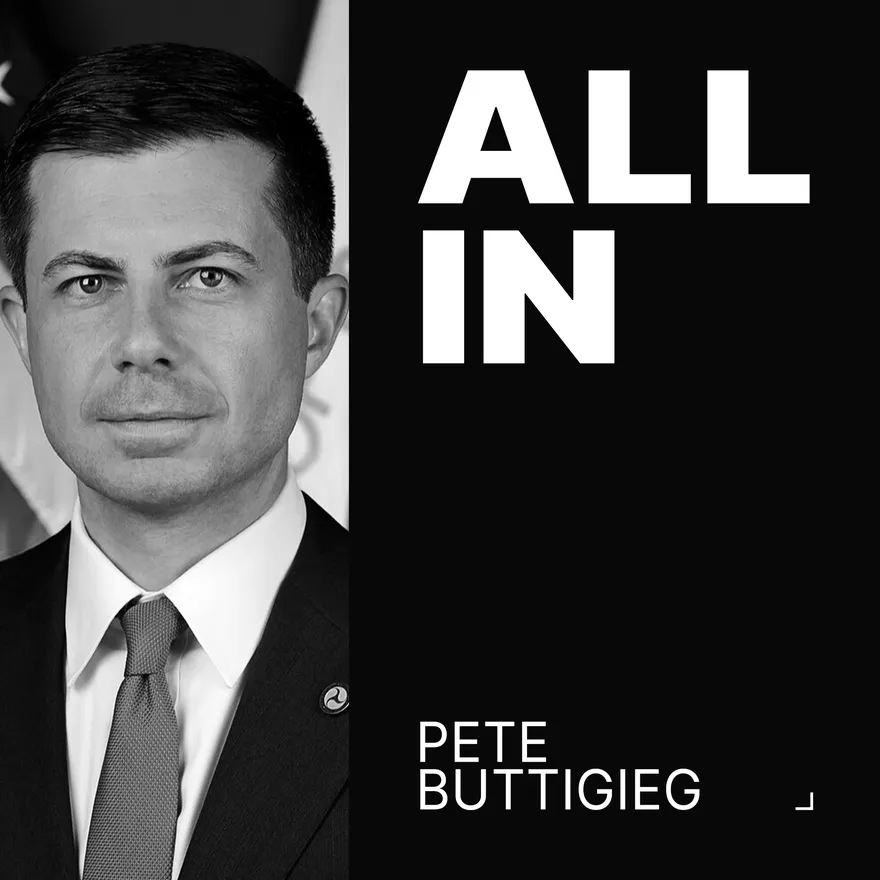
Pete Buttigieg: The Left's Identity Crisis, Wealth Tax, 2024 Mistakes, Plans for 2028
In this episode of All-In, Pete Buttigieg, former Secretary of Transportation, discusses the government's role in addressing economic challenges and market gaps. He explains how government investment in infrastructure projects like EV charging stations aims to balance state implementation with domestic industry growth, while also sharing his perspective on national debt management and wealth inequality in the United States.
The conversation explores current challenges within the Democratic Party, including tensions between moderates and progressives on issues like taxation and regulation. Buttigieg addresses how identity politics has affected the party's messaging and support base. The discussion also covers the impact of technological advancement on employment, examining recent job elimination announcements from major companies and the potential effects of autonomous vehicle technology on transportation safety.
Oct 30, 2025

Nobel Peace Prize Winner: María Corina Machado on Defeating Maduro, Socialism & Freeing Venezuela
In this episode of All-In, María Corina Machado details Venezuela's transformation under Hugo Chávez and Nicolás Maduro's 26-year rule. She explains how Chávez used surging oil prices to fund his populist agenda while dismantling democratic institutions, and how Maduro later strengthened the regime's control through connections with international criminal networks. The discussion covers the impact of these policies on Venezuela's population, including widespread poverty and the exodus of 9 million citizens.
Machado shares her journey from businesswoman to political activist, including her role in organizing a recall referendum against Chavez and her election to the National Assembly. She discusses the importance of international support in Venezuela's push for democracy, particularly regarding sanctions against the Maduro regime, and outlines her vision for transforming Venezuela into a technology-driven economy and regional hub for energy and innovation.
Oct 28, 2025

Nobel Prize in Physics Winner: John Martinis on the State of Quantum
In this episode of All-In, quantum physicist John Martinis explains the core principles of quantum mechanics and its departure from classical physics. He discusses how particles can exist in multiple states and exhibit wave-like properties, and describes the quantum tunneling phenomenon where particles pass through seemingly impassable barriers.
The conversation traces Martinis' research journey from his graduate work on macroscopic quantum effects to his development of superconducting qubits for quantum computers. He shares insights about the 2019 Google quantum supremacy experiment, where a 53-qubit system outperformed classical computers, and discusses the potential path toward million-qubit quantum computers through improved construction methods and AI-assisted error correction.
Oct 27, 2025

NBA Gambling Scandal, Tesla Trillion Dollar Vote, Billionaire Tax, Amazon Robots, AWS Outage
In this episode of All-In, the hosts examine California's proposed 5% wealth tax on billionaires and its potential economic consequences. The discussion covers how the tax could affect wealthy residents' decisions to relocate, drawing parallels to similar situations in other states and countries. They also explore Amazon's plans to automate most of its warehouse operations by 2033, and the broader implications of workplace automation and AI technology.
The conversation extends to biases in AI development, particularly focusing on recent findings about OpenAI's GPT-40 and the challenges of addressing these issues. The hosts also delve into the role of proxy advisory firms in corporate governance, examining Elon Musk's criticism of firms like Glass Lewis and ISS, while considering potential improvements to the current system through technologies like tokenization.
Oct 24, 2025
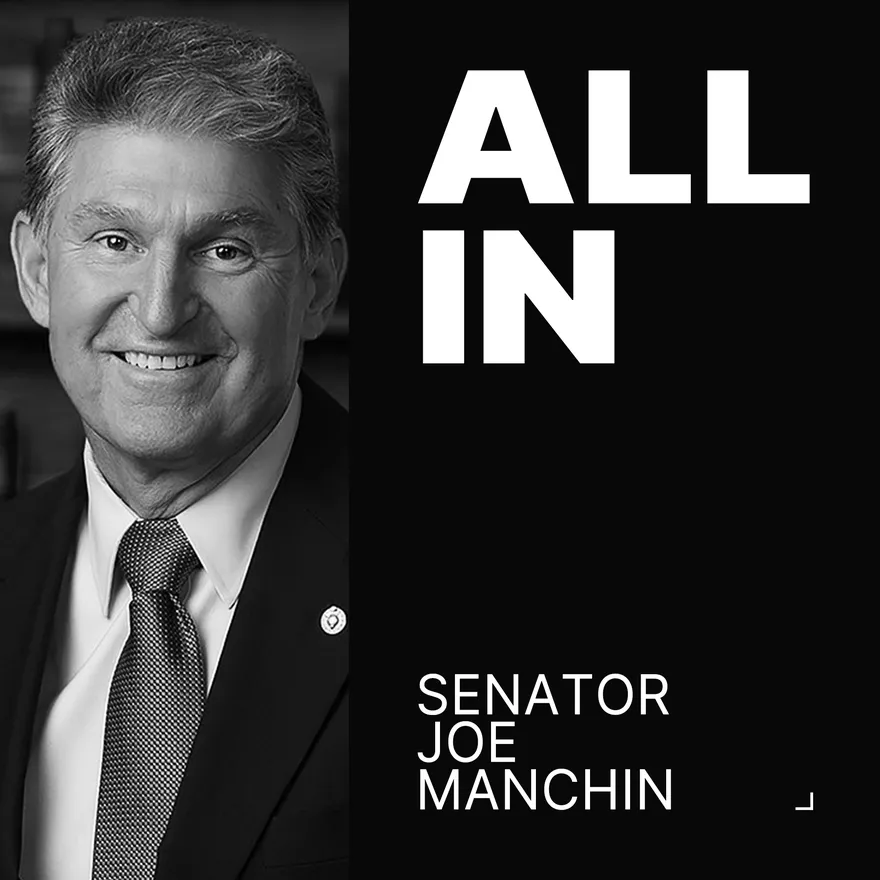
Joe Manchin on the Fight for America’s Future: Term Limits, Bipartisanship & the 2028 Election
In this episode of All-In, Joe Manchin discusses his approach to politics as a centrist Democrat and his experiences navigating party conflicts. He shares insights into his decision-making process, which balances fiscal responsibility with social compassion, and explains how his coal mining background influences his policy positions. He also details his opposition to the "Build Back Better" legislation and his response to pressure from Democratic Party leadership.
Manchin examines the Senate's role as a deliberative body and emphasizes the importance of the filibuster in promoting bipartisan cooperation. He critiques the current two-party system and primary process, suggesting they push politicians toward extreme positions and exclude independent voters. The discussion covers potential reforms, including term limits and changes to the primary system, aimed at creating a more representative political landscape.
Oct 23, 2025
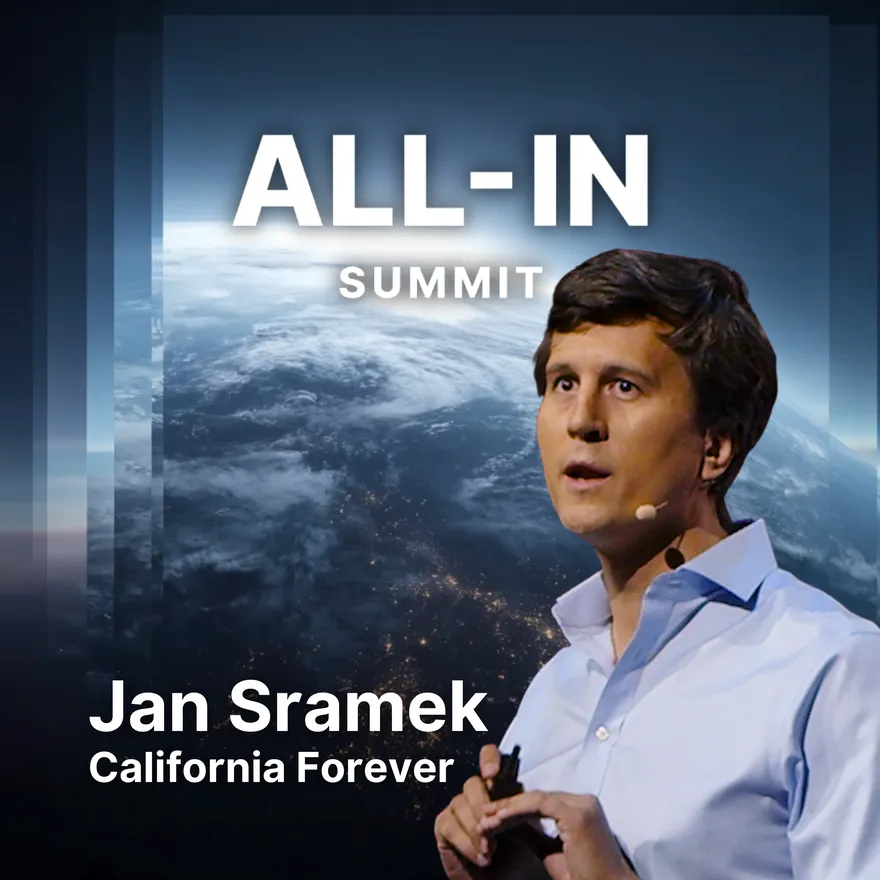
California Forever: The Startup Building America's Next Great City
In this episode of All-In, Jan Sramek discusses his project California Forever, an initiative to build a new city and manufacturing hub in Solano County, California. Sramek outlines plans to address California's housing challenges through the development of a sustainable community designed to accommodate up to 400,000 people in walkable neighborhoods inspired by traditional American architecture.
The discussion covers the project's three major components: a planned advanced manufacturing park called Solano Foundry, which aims to be the largest in the United States; a extensive shipbuilding facility spanning 6.5 miles of waterfront; and a new sustainable city spanning over 100 square miles. Sramek explains how these facilities will support local industry while providing residents with amenity-rich living spaces close to their workplaces.
Oct 21, 2025

National Guard in SF? US vs China on Rare Earths, Trump-Xi Meeting, Price Floors, AI's PR Crisis
In this episode of All-In, the hosts examine China's recent export controls on rare earth minerals and their implications for US-China trade relations. The discussion explores China's strategic dominance in these critical materials, which are essential for modern technologies, and the United States' efforts to reduce its dependency through domestic mining and strategic reserves.
The conversation broadens to include China's historical economic power and its current position as a geopolitical challenger to the US. The hosts also address the impact of AI and automation on employment, with differing perspectives on whether technological advancement will lead to job losses or transformations, and examine how large corporations might help communities adapt to these changes.
Oct 17, 2025
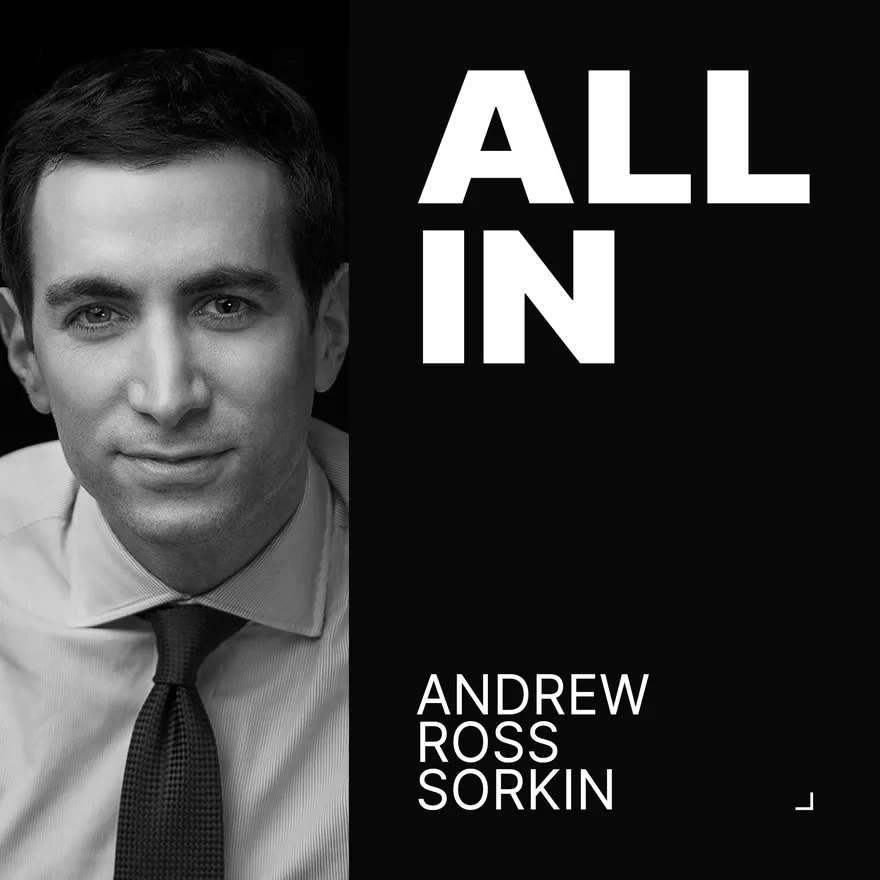
1929 vs 2025: Andrew Ross Sorkin on Crashes, Bubbles & Lessons Learned
In this episode of All-In, Andrew Ross Sorkin examines the factors that led to the 1929 stock market crash, focusing on the rise of consumer credit, widespread market speculation, and the media's role in celebrating business leaders. He discusses how companies like General Motors and Sears Roebuck introduced consumer lending, while figures like Charlie Mitchell of National City Bank promoted easy credit despite Federal Reserve concerns.
The discussion explores parallels between 1929 and current economic conditions, including speculation in AI, private credit, and real estate. Sorkin and the hosts analyze key differences in today's regulatory environment, particularly the Glass-Steagall Act's separation of commercial and investment banking, while examining ongoing challenges in balancing regulation with innovation in the financial sector.
Oct 16, 2025
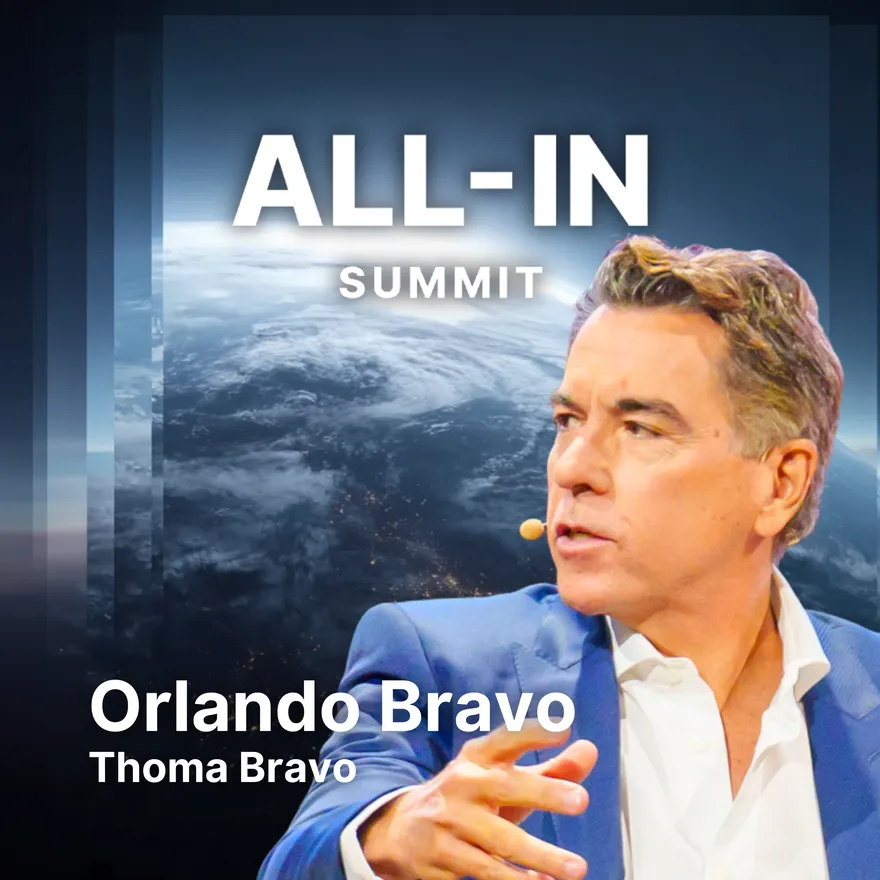
How Orlando Bravo Built One of the Most Successful Firms in Private Equity
In this episode of All-In, Orlando Bravo shares his path from playing tennis in Puerto Rico to building one of the largest private equity firms in the world. The discussion traces how early experiences and mentorship shaped his career trajectory, leading him from initial rejections in private equity to founding Thoma Bravo, a firm that raised a $34.4 billion fund in 2022.
Bravo explains his firm's investment approach, which focuses on selecting a small number of high-performing companies, particularly in the software sector. He discusses how private equity has evolved beyond financial engineering to emphasize growth and innovation, with firms now operating more like venture capitalists and considering their broader impact on employees, customers, and communities.
Oct 15, 2025
Create Summaries for anything on the web
Download the Shortform Chrome extension for your browser


Bryan Johnson: The #1 Longevity Secret You Can Start Doing Today
In this episode of All-In, Bryan Johnson shares his findings on biological aging and how different organs age at different rates, using his own body as a case study. He discusses his experimental approach to longevity through lifestyle modifications, including precise meal timing, screen usage management, and caffeine intake regulation. His research suggests that understanding organ-specific aging is key to developing targeted strategies for extending human life.
Johnson also emphasizes the fundamental role of sleep in health and cognition, challenging common cultural beliefs about sacrificing sleep for success. He outlines specific practices for improving sleep quality and introduces his "Don't Die" philosophy, which positions life extension as a potential unifying goal for humanity. Through his research and personal experiments, Johnson presents sleep optimization and biological age management as crucial components of human longevity.
Oct 14, 2025

Cathie Wood on How AI Can Double GDP, Bull Case for Bitcoin $1M, Elon’s Trillion-Dollar Pay Package
In this episode of All-In, Cathie Wood discusses how the convergence of multiple technologies, including AI, robotics, and blockchain, could impact economic growth. Wood explains her research methodology and forecasts that this technological convergence might push real GDP growth above 7% annually in the next 5-10 years—double the historical average.
The discussion covers Wood's investment approach at Ark Invest, including how the firm evaluates companies during market volatility and manages high-conviction investments. She shares her perspective on Bitcoin valuation, suggesting a potential value of $1.5 million in her bull case, and addresses topics such as retail investor access to private markets and CEO compensation structures that align with company growth targets.
Oct 14, 2025

Trump Brokers Gaza Peace Deal, National Guard in Chicago, OpenAI/AMD, AI Roundtripping, Gold Rally
In this episode of All-In, the hosts examine Trump's role in brokering a multi-stage peace deal between Israel and Hamas, discussing the implications for Middle East stability and economic diversification in the region. They also explore the controversy surrounding National Guard deployments for immigration enforcement, including proposed alternative approaches to immigration policy.
The conversation covers developments in the AI sector, particularly the partnership between AMD and OpenAI, and the unprecedented scale of computing infrastructure investment. The hosts analyze the Trump administration's high-risk, high-reward approach to various policy areas, from international diplomacy to domestic initiatives, and discuss the varying public response to these policies across different domains.
Oct 10, 2025
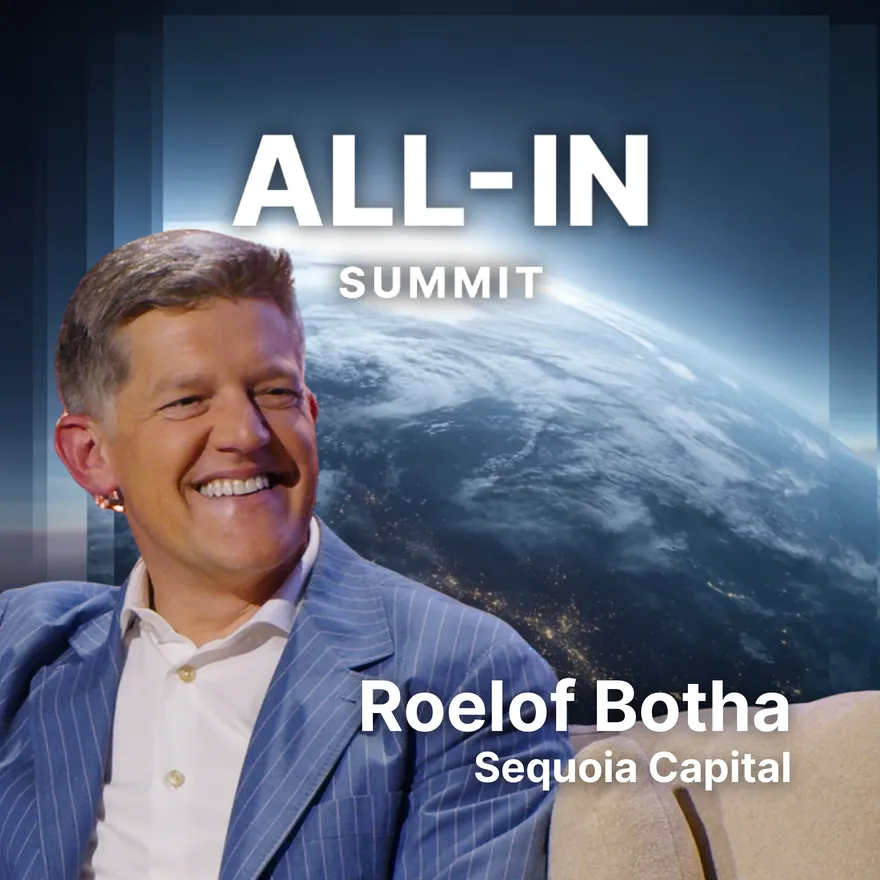
Sequoia’s Roelof Botha: Why Venture Capital is Broken & How Great Companies Are Built
In this episode of All-In, Sequoia Capital's Roelof Botha shares insights into venture capital's current challenges and transformations. He discusses how the industry faces difficulties due to excessive investment, requiring over $1 trillion in annual exits to maintain returns, and explains Sequoia's Scouts Program, which has achieved a 26x multiple on investments by enabling talented founders to invest in promising startups.
Botha outlines Sequoia's approach to investment management and organizational structure, including their strategy of retaining shares in successful companies post-IPO. He also addresses the firm's international investment experience, particularly in China, where regulatory uncertainty has significantly impacted new company formations. The discussion covers how Sequoia balances individual initiative with collective decision-making while maintaining its status as a private partnership focused on long-term stability.
Oct 9, 2025
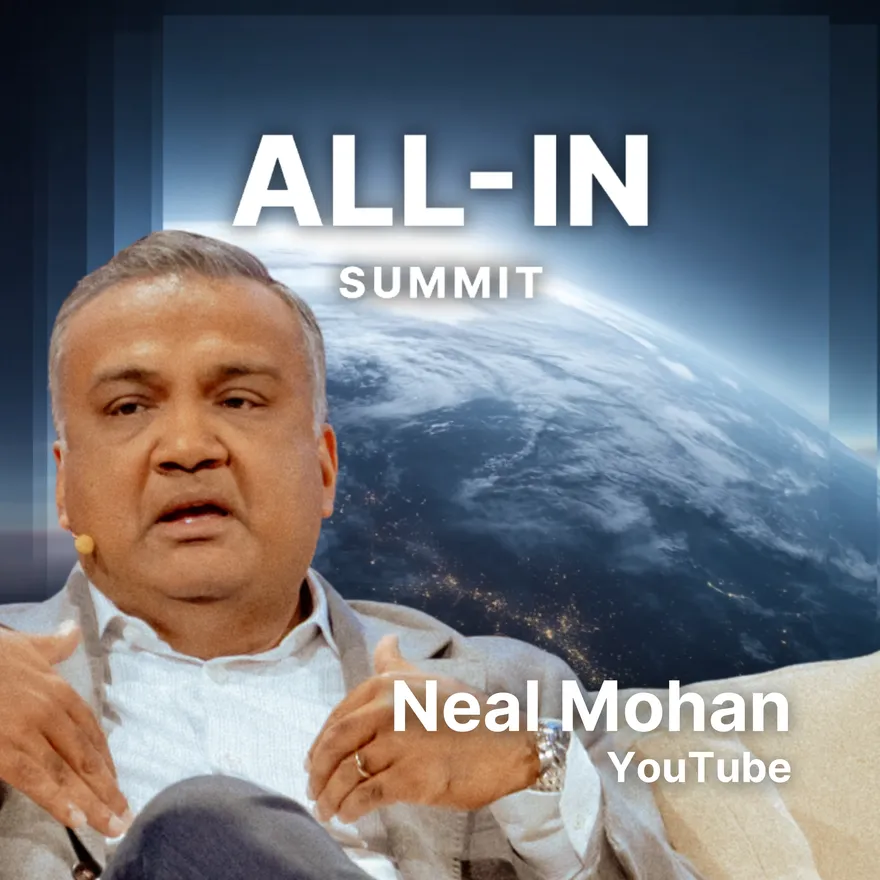
YouTube CEO Neal Mohan on AI, Censorship & the Future of Creators
In this episode of All-In, YouTube CEO Neal Mohan discusses the platform's evolution and current state, including YouTube Shorts' growth to 70 billion daily views and the distribution of more than $70 billion to creators over three years. He explains YouTube's revenue-sharing model and the various ways creators can monetize their content, while addressing concerns about the platform's fee structure.
The conversation explores YouTube's content moderation approach during the COVID pandemic and its strategy for managing AI-generated content. Mohan also details how YouTube adapts to changing viewer behaviors, particularly the shift from scheduled to on-demand programming, while maintaining its position as the leading streaming platform in the US with approximately 13-14% of TV viewing share.
Oct 8, 2025
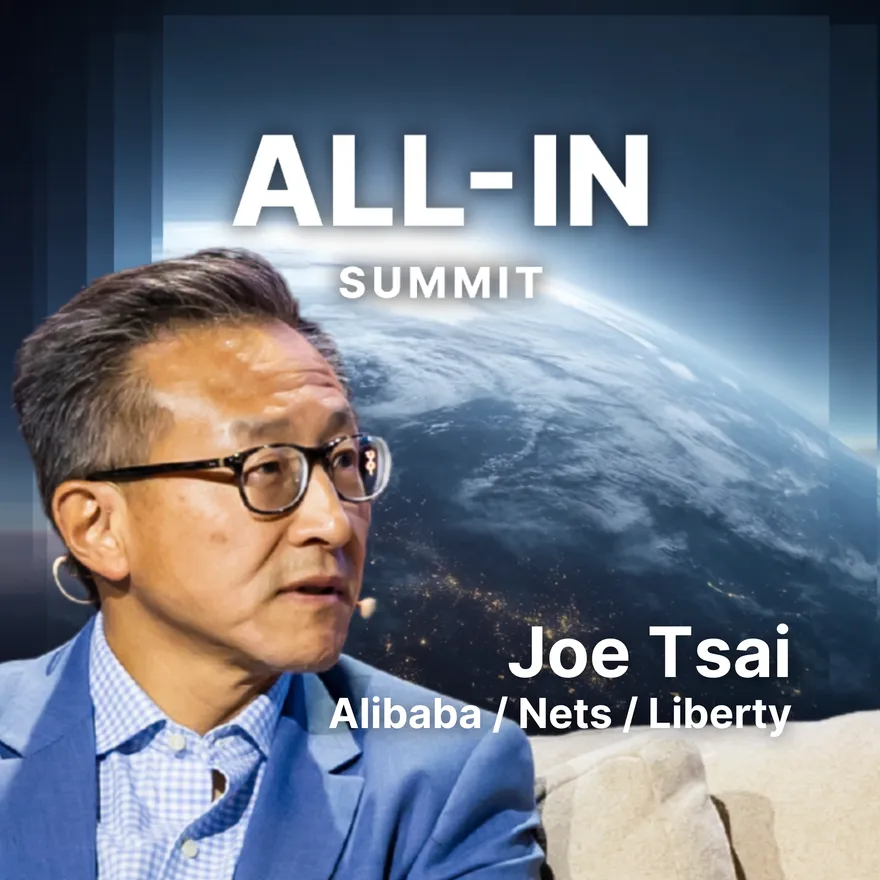
Joe Tsai on US-China Rivalry, AI's Future, Owning the Nets/Liberty, Caitlin Clark's Major Impact
In this episode of All-In, Joe Tsai shares insights on professional basketball, discussing how Caitlin Clark has driven major growth in WNBA viewership and ticket sales. As a member of the NBA Competition Committee, he explains the league's ongoing efforts to refine its rules and enhance the fan experience, while also addressing the different playing styles between the WNBA and NBA.
The conversation extends beyond sports to cover Tsai's experience at Alibaba, where AI now writes 30% of the company's code, and his perspective on US-China relations. Tsai discusses China's AI adoption strategy and describes how Alibaba has adapted to increased government regulation. He also touches on his role as owner of the Brooklyn Nets and their rebuilding strategy.
Oct 8, 2025

Biggest LBO Ever, SPAC 2.0, Open Source AI Models, State AI Regulation Frenzy
In this episode of All-In, the hosts examine the expanding influence of private equity, which has seen its assets triple to over $5 trillion since 2015. The discussion covers how this surge in capital affects asset valuations and returns, highlighting a major development in the industry: a $55 billion take-private deal for Electronic Arts led by a consortium including the Saudi Public Investment Fund.
The conversation then shifts to two significant AI developments: the adoption of Chinese open-source language models by US businesses, and the wave of state-level AI regulations across America. The hosts explore how these Chinese models offer competitive pricing compared to US alternatives, while also addressing concerns about the potential impact of fragmented state regulations on AI innovation and international competitiveness.
Oct 3, 2025
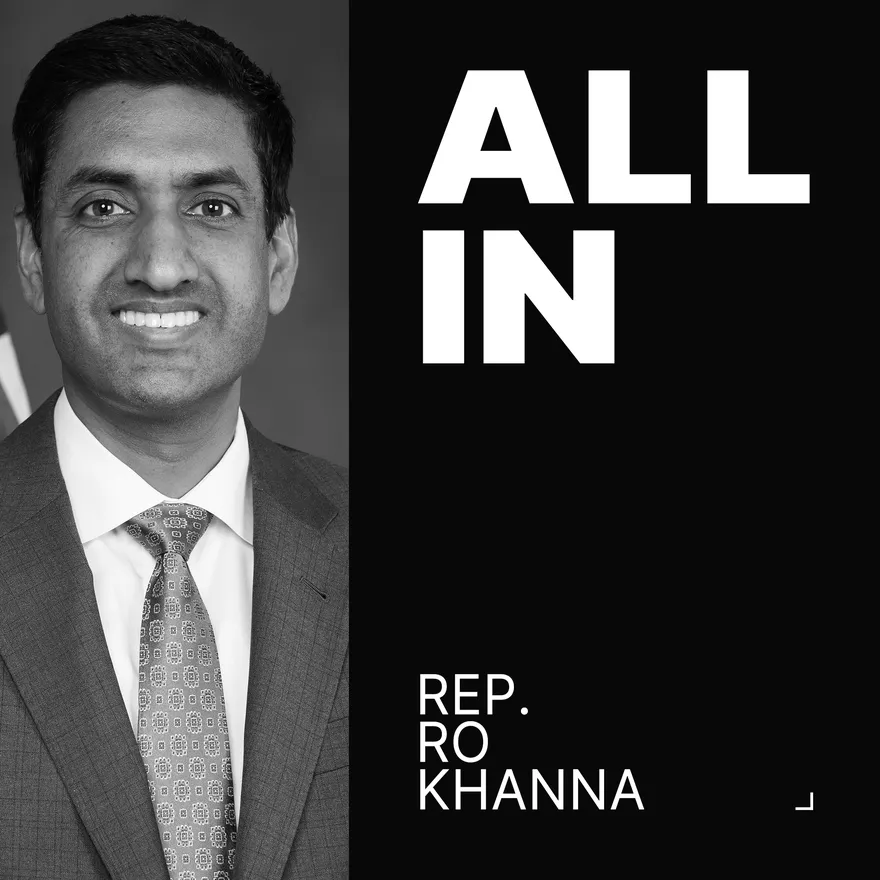
Ro Khanna on Crime, Censorship & Congress: Fixing What’s Broken in America
In this episode of All-In, Congressman Ro Khanna discusses several key issues facing America today, including immigration reform and the Democratic Party's relationship with the tech industry. The conversation covers proposed changes to the H-1B visa program to prevent worker exploitation while maintaining American competitiveness, particularly in AI development. Khanna also shares his perspective on the Democrats' missed opportunity to position themselves as champions of innovation and entrepreneurship.
The discussion extends to other pressing national concerns, including the current state of political discourse and its contribution to societal polarization. Khanna and the hosts examine challenges in the criminal justice system, debating the balance between reform and public safety. The conversation concludes with Khanna's position on congressional stock trading and his proposals for preventing conflicts of interest among lawmakers.
Oct 2, 2025
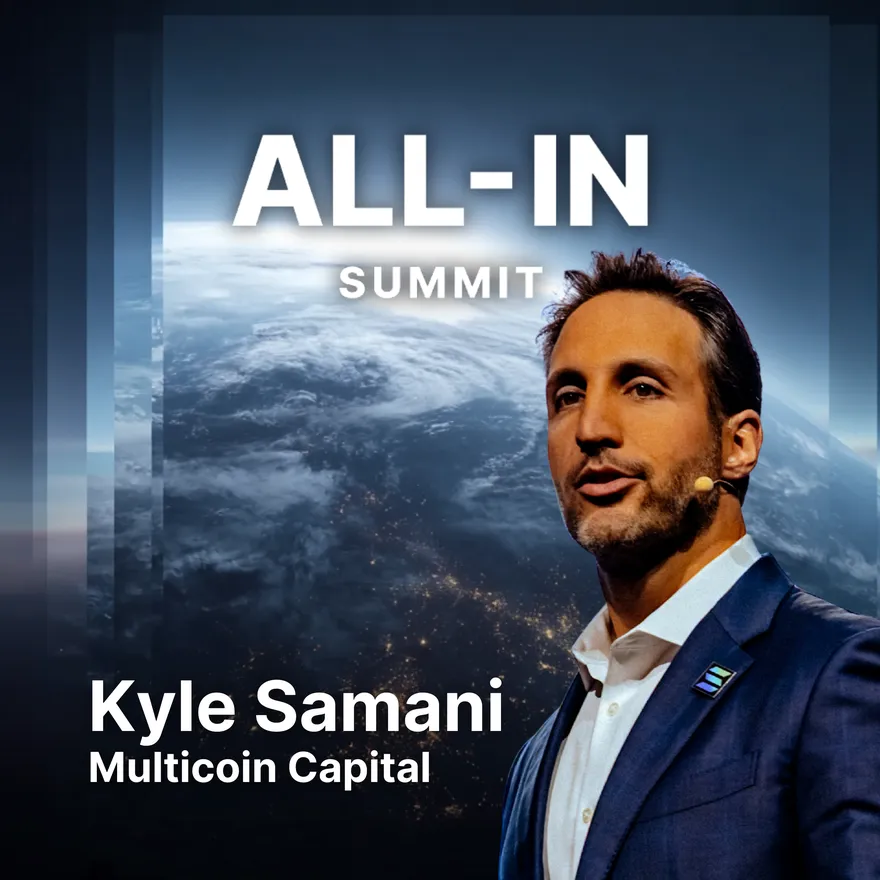
Multicoin Capital’s Kyle Samani on Internet Capital Markets
On All-In, Kyle Samani explores how blockchain technology could transform traditional financial markets by addressing inefficiencies in the current system. He discusses how outdated post-1929 regulations have created a complex web of intermediaries, fees, and delays that persist even in 2025, while modern blockchain networks like Solana demonstrate the potential for faster, cheaper, and more accessible financial transactions.
The discussion examines regulatory changes that could enable blockchain integration in traditional markets, including new executive orders and SEC rule modernization. Samani describes a future where capital markets extend beyond traditional financial hubs into everyday digital experiences, with possibilities ranging from real-time sports betting to peer-to-peer trading through social platforms, all powered by AI and blockchain technology.
Oct 1, 2025
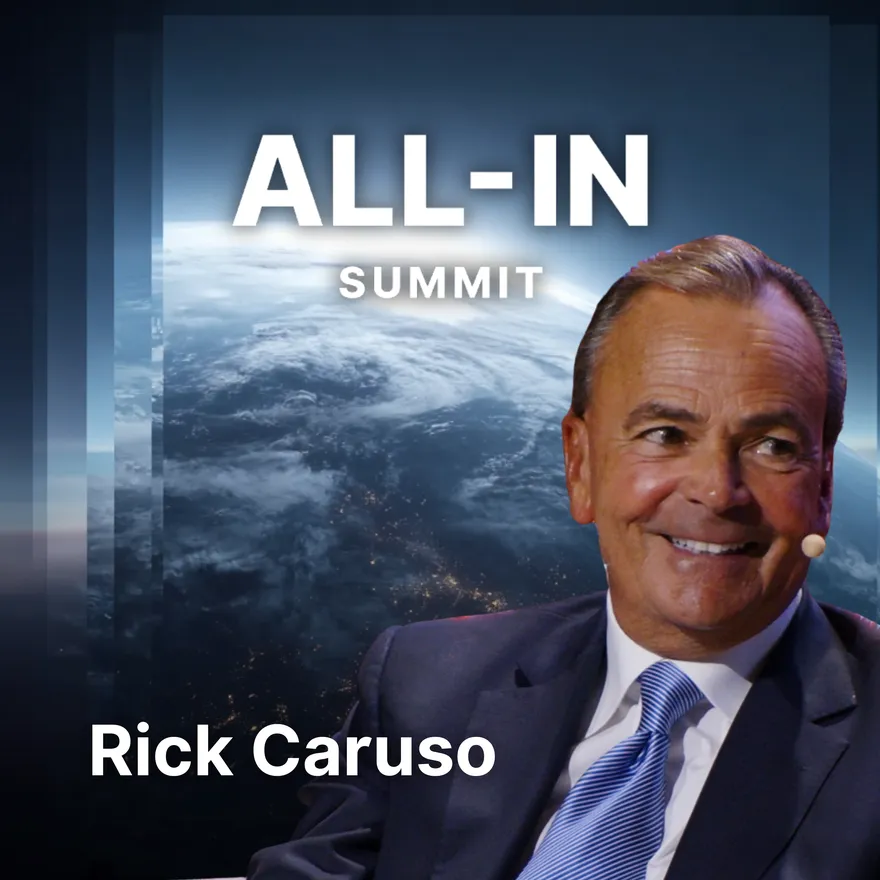
Rick Caruso on California’s Collapse: Broken Leadership, LA Wildfire Failures & the Fix
In this episode of All-In, Rick Caruso joins the hosts to discuss leadership challenges in Los Angeles and the city government's response to recent disasters. The conversation examines how remote work policies and bureaucratic processes have affected the city's ability to handle emergencies, with specific focus on the response to wildfires near Pacific Palisades, where private resources had to supplement public firefighting efforts.
The discussion also explores potential solutions to Los Angeles's current problems, including the role of business-oriented leadership in public service and its potential impact on quality of life measures. Caruso and the hosts analyze how voter participation patterns in Los Angeles affect political outcomes, and examine aspects of California's electoral system, including ballot harvesting and voter ID laws.
Sep 30, 2025
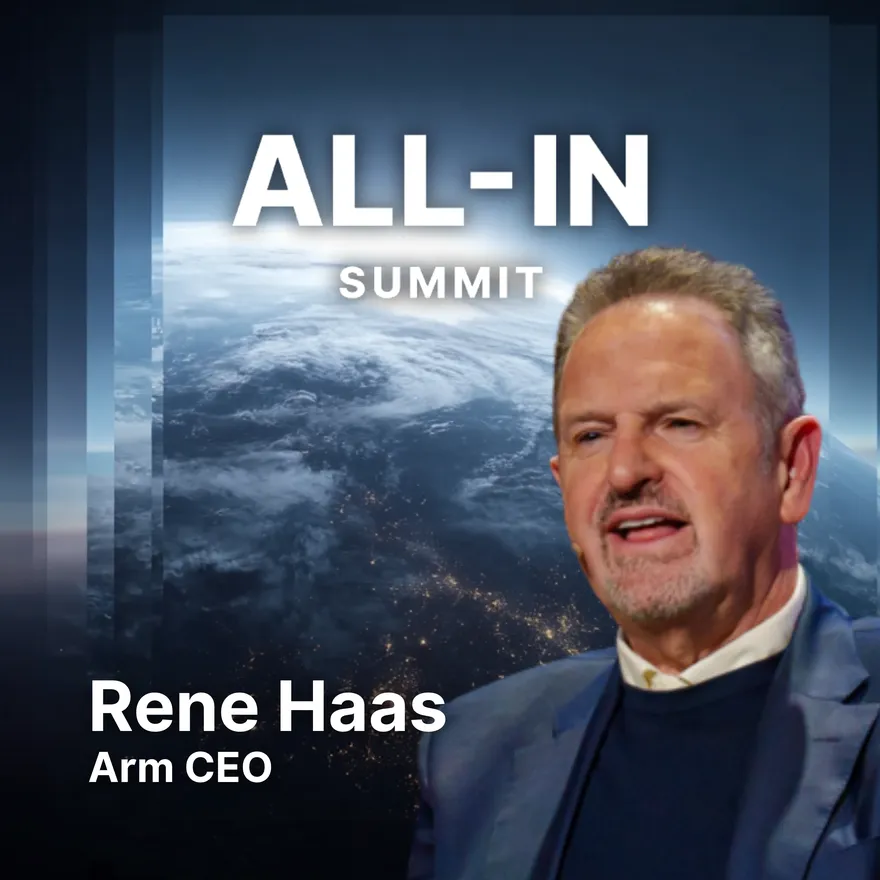
Arm CEO Rene Haas on AI: Nvidia Lessons, Intel’s Decline and the US-China Chip War
In this episode of All-In, Arm CEO Rene Haas explores the evolving semiconductor industry landscape, discussing how Arm grew from designing chips for the Apple Newton to becoming a global leader in semiconductor IP. The discussion covers the relationship between Arm and Nvidia, and examines how artificial intelligence is reshaping chip design, with companies increasingly developing specialized AI chips for different purposes.
Haas also addresses the challenges facing U.S. semiconductor manufacturing, including Intel's past strategic decisions and the current dominance of TSMC in advanced chip production. The conversation extends to the geopolitical implications of semiconductor technology, examining how export controls and trade policies affect the global semiconductor ecosystem and could lead to the development of separate technological regions.
Sep 30, 2025
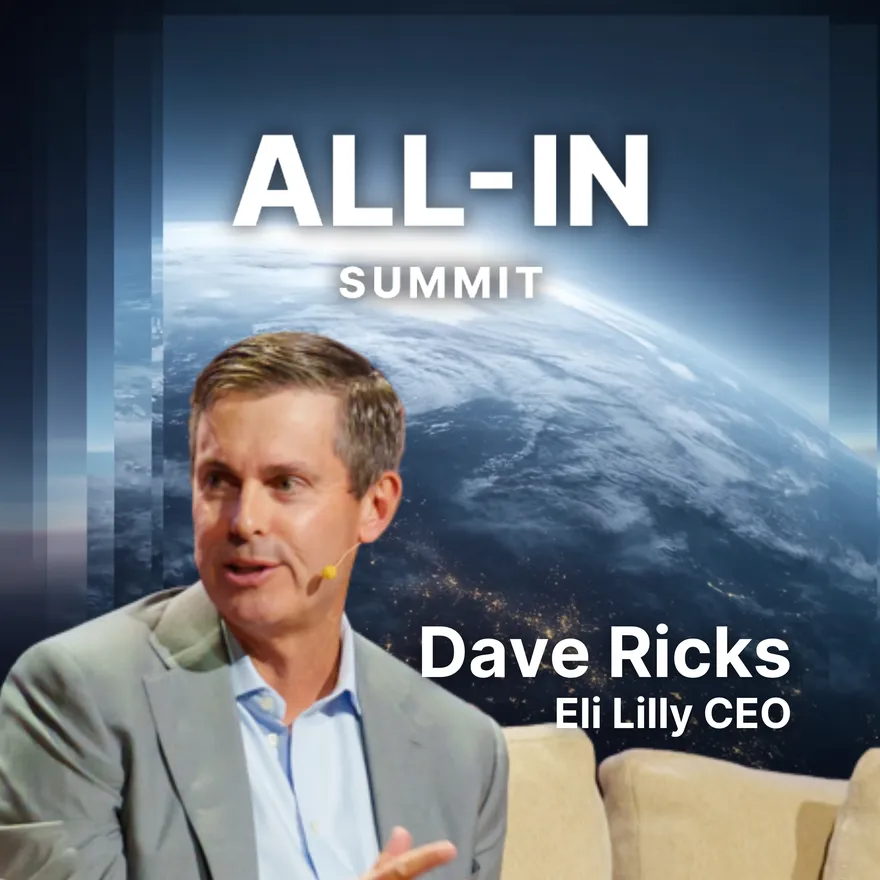
Inside the GLP-1 Gold Rush: Eli Lilly CEO on New Breakthroughs, Addiction & Mental Health, Pricing
In this episode of All-In, Eli Lilly CEO Dave Ricks discusses his company's development of GLP-1 drugs, which began with an unexpected discovery during diabetes treatment research and led to the creation of Monjaro. The discussion covers the rapid commercial growth of these medications, which now reach approximately 20 million people globally, and examines their potential benefits beyond weight loss, including possible improvements in mental health and reduced dementia risk.
The conversation also delves into the business aspects of GLP-1 drugs, including Eli Lilly's efforts to balance profitability with accessibility through insurance coverage and pricing strategies. Ricks addresses the challenges of protecting intellectual property rights, particularly regarding counterfeit products in international markets, while sharing insights into the company's research infrastructure and manufacturing expansion plans.
Sep 29, 2025
Create Summaries for anything on the web
Download the Shortform Chrome extension for your browser


H-1B Shakeup, Kimmel Apology, Autism Causes, California Hate Speech Law
In this episode of All-In, the hosts examine proposed reforms to the H-1B visa program, including suggestions for a high application fee and an auction system to address concerns about wage suppression and worker displacement. The discussion also covers debates around media bias and censorship, with particular focus on a California hate speech bill and how media outlets approach controversial claims.
The hosts delve into recent developments in artificial intelligence, exploring MIT researchers' breakthrough in improving language model accuracy and German innovations in AI hardware architecture. The conversation touches on the implications of these advances for local computing capabilities and examines China's strategic approach to AI development in the context of global competition for engineering talent.
Sep 27, 2025

Eric Schmidt on AI, the Battle with China, and the Future of America
In this episode of All-In, former Google CEO Eric Schmidt explores artificial intelligence's current state and future trajectory. He discusses how AI agents are evolving toward autonomous operation, with potential narrow superintelligence emerging in the next six to seven years, while highlighting the ongoing challenges in developing general intelligence that can adapt to changing human objectives.
Schmidt examines the AI competition between the United States and China, contrasting China's open-source strategy with America's proprietary development approach. The discussion extends to AI's impact across multiple domains, including business practices and modern warfare, where Schmidt uses the Ukraine conflict to illustrate how AI and drone technology are reshaping military strategy and the nature of combat operations.
Sep 24, 2025

Charlie Kirk Murder, Assassination Culture in America, Jimmy Kimmel Suspended, Ellison Media Empire
In this episode of All-In, the hosts examine the broader implications of Charlie Kirk's murder and its connection to what some call "assassination culture" in America. The discussion explores how social media algorithms and content moderation policies may contribute to political radicalization, particularly among young people, with the panel addressing specific instances of content censorship and the need for algorithm transparency.
The conversation delves into concerns about the growing acceptance of political violence, examining how mainstream media and educational institutions might influence this trend. The hosts discuss the role of college campuses in fostering independent thinking and highlight challenges to maintaining respectful political dialogue in today's climate, emphasizing the fundamental importance of open debate in democratic society.
Sep 19, 2025
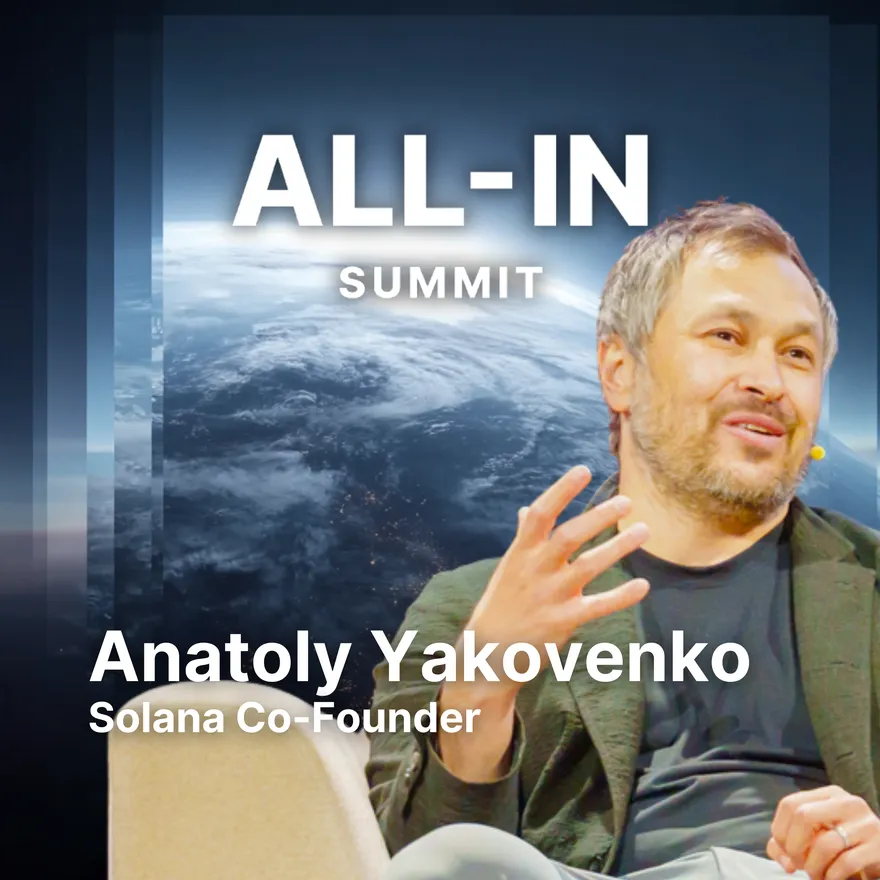
Solana’s Anatoly Yakovenko on Crypto's Next Era: Quantum, AI, and the Future of Money
In this episode of All-In, Solana co-founder Anatoly Yakovenko discusses the evolving cryptocurrency landscape, including regulatory changes in the U.S. and their impact on the industry. He shares his vision of Solana becoming a high-speed execution layer for global financial markets, operating alongside Ethereum, and explains how traditional financial institutions could integrate with blockchain technology.
The conversation explores potential applications of crypto beyond finance, particularly in creator economies and community building. Yakovenko also addresses key concerns about cryptocurrency security, including the risks of centralization and the potential impact of quantum computing advances. The discussion covers both immediate challenges facing the crypto industry and longer-term considerations for its development and adoption.
Sep 18, 2025
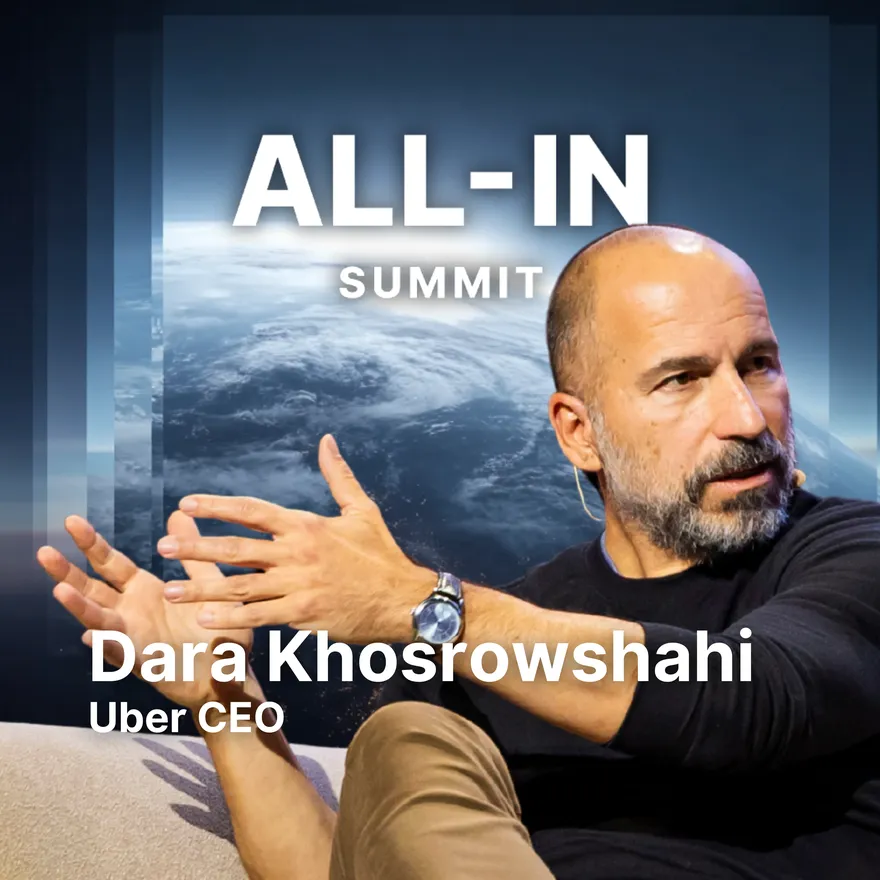
Uber CEO Dara Khosrowshahi on self-driving's future, changing business model, job displacement
In this episode of All-In, Uber CEO Dara Khosrowshahi discusses the company's strategy for integrating autonomous vehicles (AVs) into its services. He outlines Uber's partnerships with over 20 companies in mobility and delivery sectors, including collaborations with Waymo in U.S. cities and several Chinese firms that have deployed Level 4 AVs. He explains how Uber's existing network provides advantages over standalone AV fleets and describes the company's expansion into autonomous delivery services.
The discussion also addresses the social implications of AV adoption. Khosrowshahi details Uber's approach to managing the transition to autonomous systems, including plans to moderate driver recruitment in markets launching AVs and efforts to create alternative employment opportunities for workers. He emphasizes the need for careful implementation and stakeholder collaboration as autonomous vehicle technology becomes more prevalent in the transportation industry.
Sep 17, 2025
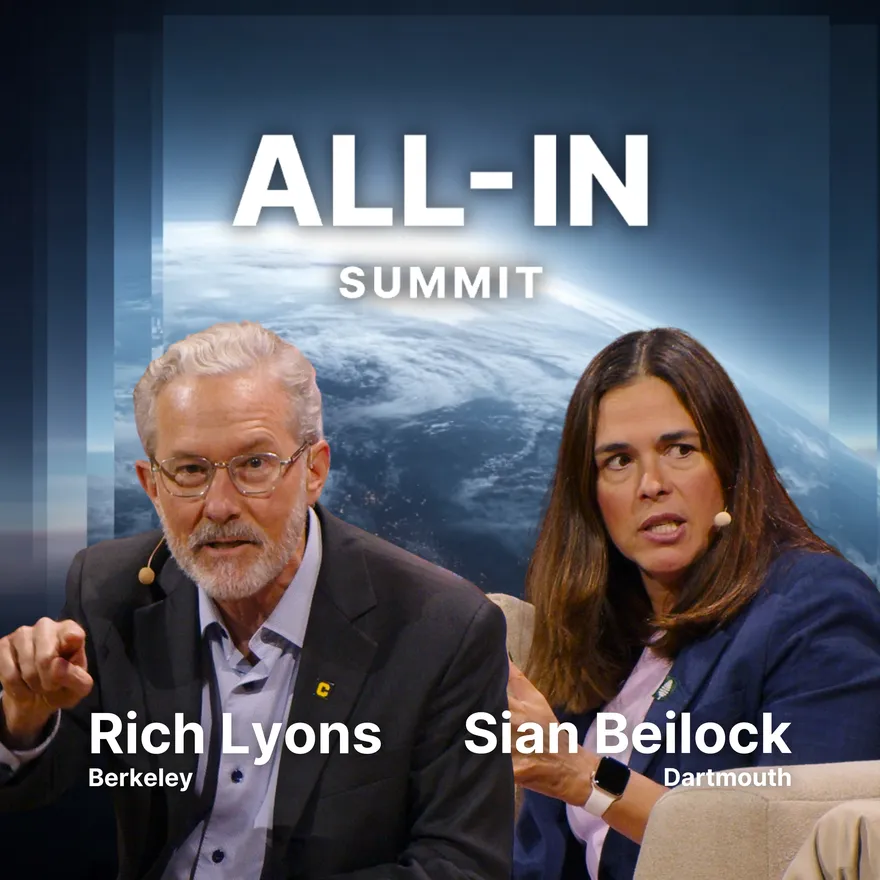
The College Crisis: Heads of Dartmouth & Berkeley Debate the Decline of US Universities
In this episode of All-In, Dartmouth President Sian Beilock and Berkeley's Rich Lyons examine the current state of U.S. higher education. The discussion covers how universities are addressing financial challenges through industry partnerships and endowments, as well as their approaches to career preparation, with both institutions implementing programs to support student economic outcomes.
The conversation explores several complex issues facing universities today, including the balance between diversity initiatives and academic standards, the maintenance of open debate on campus, and the role of artificial intelligence in education. While Beilock and Lyons acknowledge AI's potential to enhance learning, they emphasize that technology should complement rather than replace the interpersonal aspects of university education.
Sep 16, 2025
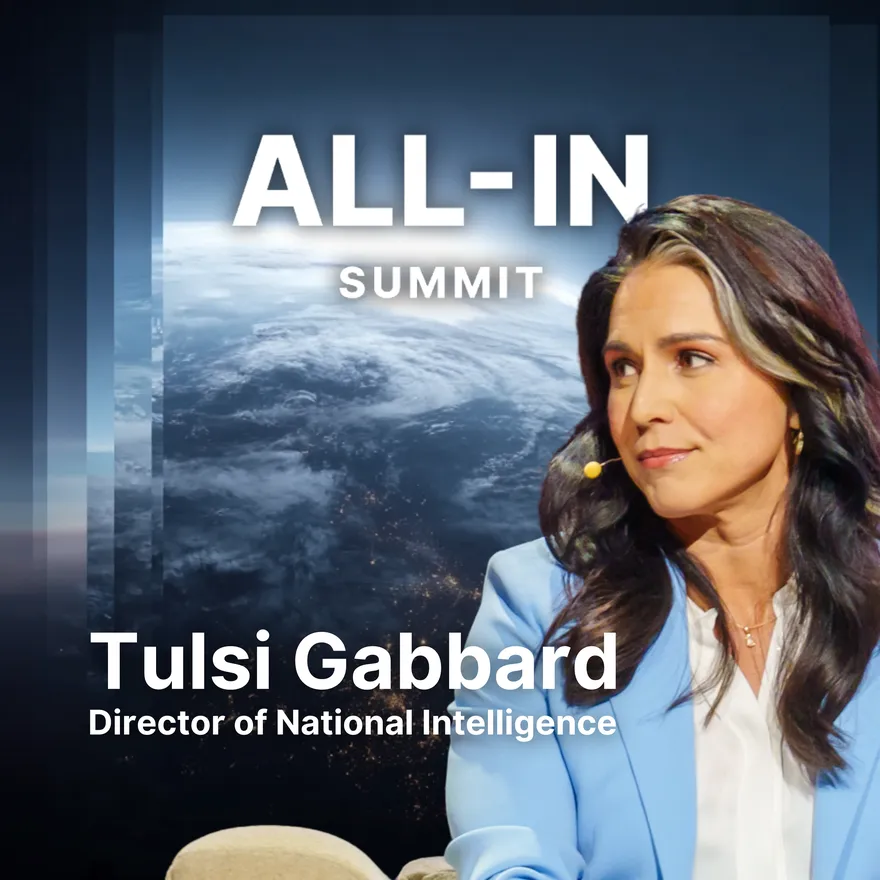
Tulsi Gabbard on Russiagate Hoax Evidence and How She’s Reforming Politicized Intelligence Agencies
In this episode of All-In, Tulsi Gabbard discusses her investigation into the intelligence community's handling of Trump-Russia collusion allegations. She shares findings about how intelligence agencies reportedly manipulated information during and after the 2016 election, drawing parallels to similar practices during the Iraq War. She also details her work at the Office of the Director of National Intelligence to address these issues and declassify relevant documents.
The conversation covers Gabbard's transition from the Democratic Party to supporting Trump, which she attributes to shifts in party values. The discussion extends to foreign policy matters, including military strategy regarding Iran and the designation of drug cartels as terrorist organizations, with Gabbard offering perspectives informed by her military background on border security and fentanyl trafficking prevention.
Sep 15, 2025
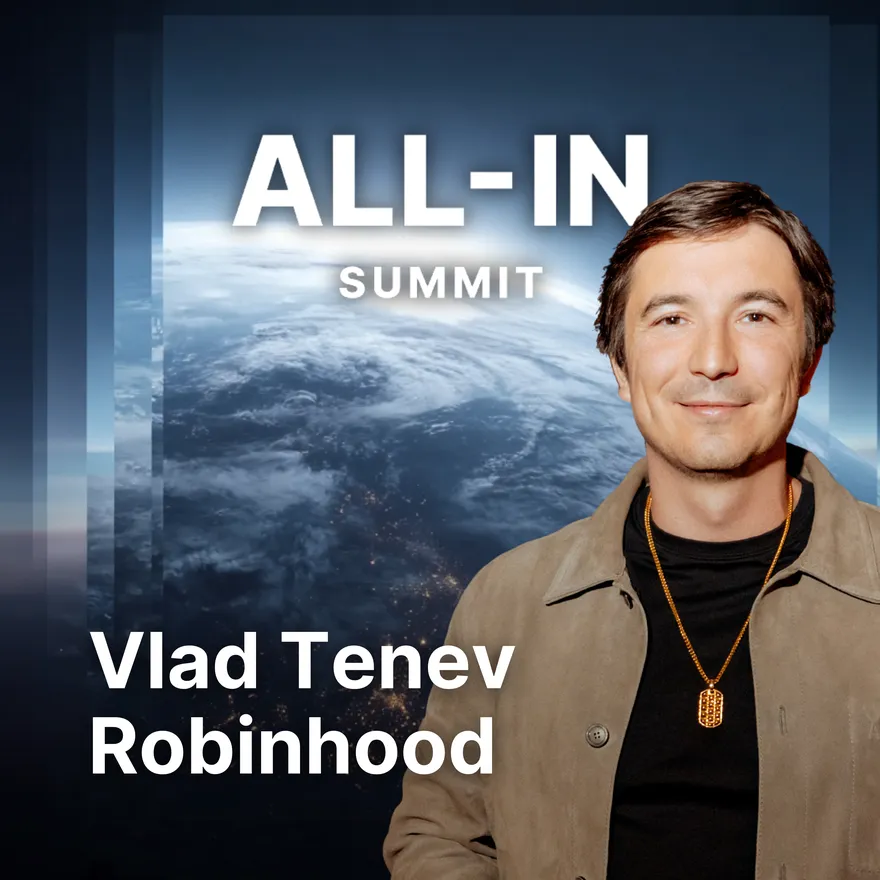
Robinhood CEO Vlad Tenev on tokenizing stocks, expanding access to private shares, fintech's future
In this episode of All-In, Robinhood CEO Vlad Tenev discusses his company's evolution from a commission-free trading platform for young investors to its current position managing over a quarter trillion dollars in assets. Tenev shares insights about his transition from quantitative analyst to entrepreneur, and explains how Robinhood's business model has adapted to serve millennial and Gen Z investors.
The conversation covers Robinhood's current initiatives in blockchain technology and artificial intelligence, including their work on stock tokenization for EU customers and AI development through Tenev's company Harmonic. Tenev also addresses Robinhood's relationship with regulators, describing how the regulatory landscape has shifted to become more receptive to fintech innovation, particularly regarding frameworks for stablecoins and tokenization.
Sep 15, 2025

Google DeepMind CEO Demis Hassabis on AI, Creativity, and a Golden Age of Science | All-In Summit
In this episode of All-In, Google DeepMind CEO Demis Hassabis shares his experience of winning the Nobel Prize and outlines his company's recent AI developments. He discusses two new AI models: Genie, which creates interactive 3D environments in real-time, and Gemini, a multimodal system now integrated into Google products. Hassabis explains how these innovations contribute to DeepMind's work in scientific discovery, particularly in areas like protein folding and drug development.
The conversation explores the current state of artificial intelligence and the path toward Artificial General Intelligence (AGI). Hassabis describes the challenges that remain in developing AGI, including the need for breakthroughs in continual learning and consistent performance. He also introduces Nano Banana, an AI image generator, and shares his perspective on how AI could transform various industries, with a particular focus on entertainment and creative applications.
Sep 12, 2025
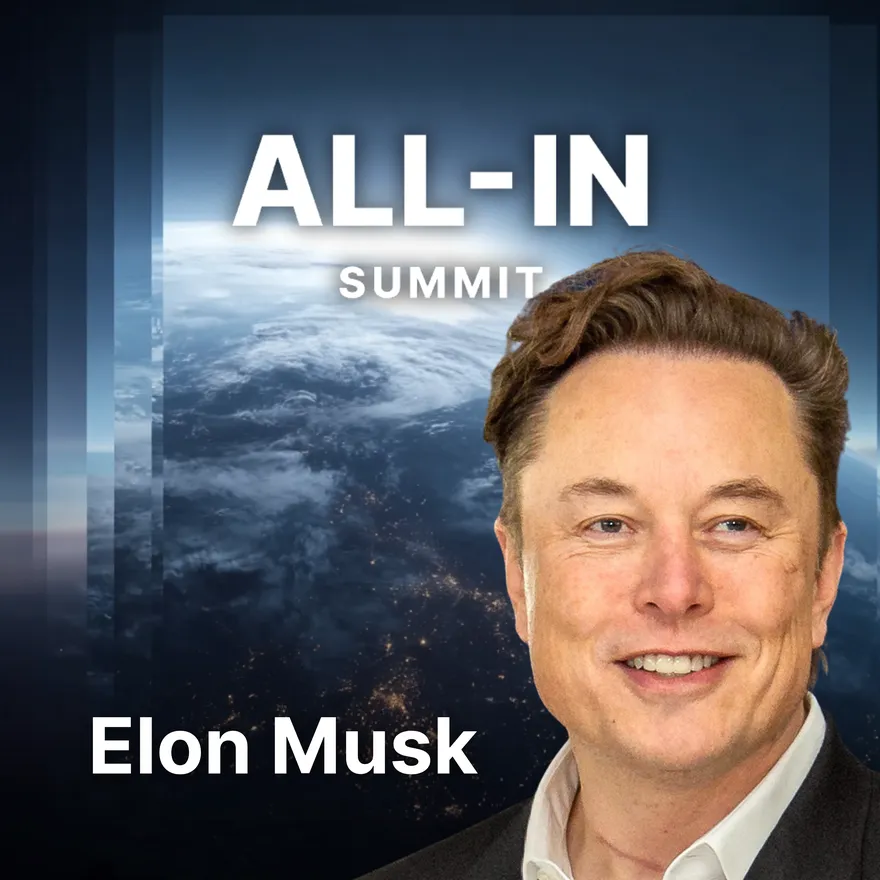
Elon Musk on DOGE, Optimus, Starlink Smartphones, Evolving with AI, Why the West is Imploding
In this episode of All-In, Elon Musk discusses Tesla's development of the Optimus humanoid robot, focusing on the technical challenges of replicating human dexterity and the potential for mass production. He also outlines Starlink's plans to provide satellite-to-phone connectivity and SpaceX's progress toward fully reusable spacecraft, including the upcoming Starship version 3.
The conversation extends to Tesla's AI system, Grok, which aims to enhance and evaluate human knowledge repositories. Musk shares his perspectives on the trajectory of artificial intelligence, suggesting AI could surpass human intelligence within decades. He also addresses broader societal topics, including his views on Western civilization's challenges and the importance of space colonization for humanity's future.
Sep 10, 2025
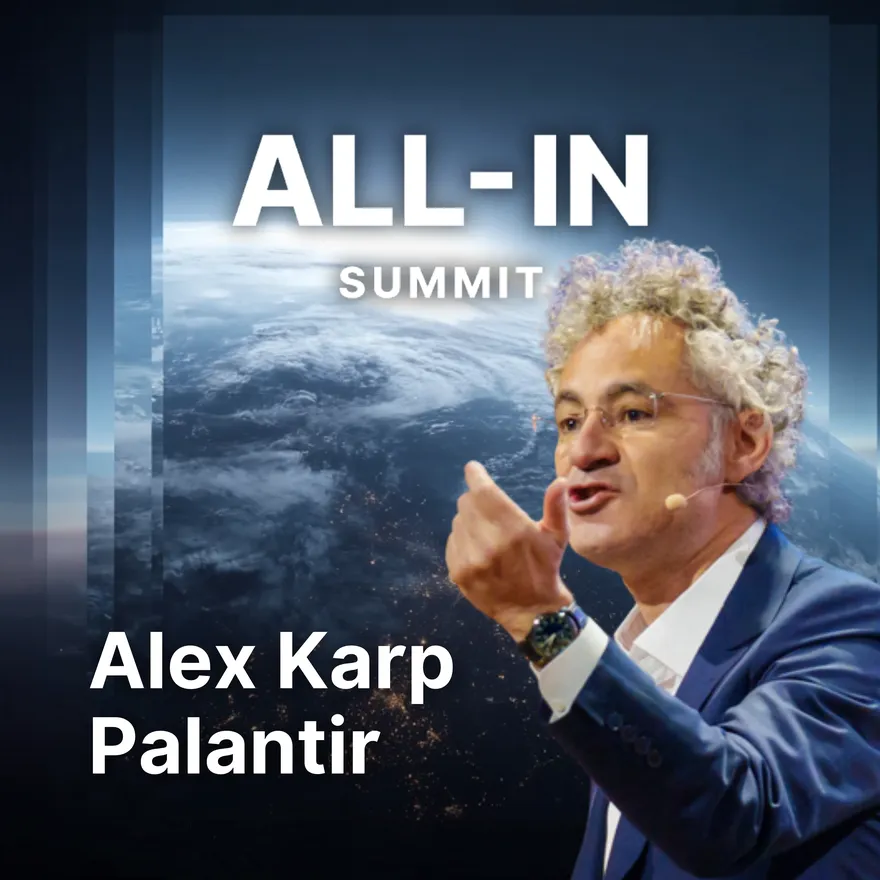
Palantir CEO Alex Karp: Why the West is Destroying Itself, Data Empire, Skeptics, How to Win
In this episode of All-In, Palantir CEO Alex Karp discusses his company's approach to data analytics and privacy in government partnerships. He addresses public concerns about surveillance while explaining Palantir's security features and ethical standards, including specific instances where the company declined government requests that could have compromised civil liberties.
Karp also shares his perspectives on broader societal issues, including immigration policy and what he sees as challenges facing Western societies. He examines current border control approaches, suggesting that technology could create more effective systems, and discusses his views on how progressive policies affect various communities. The conversation explores the intersection of technology, governance, and social policy in modern society.
Sep 9, 2025
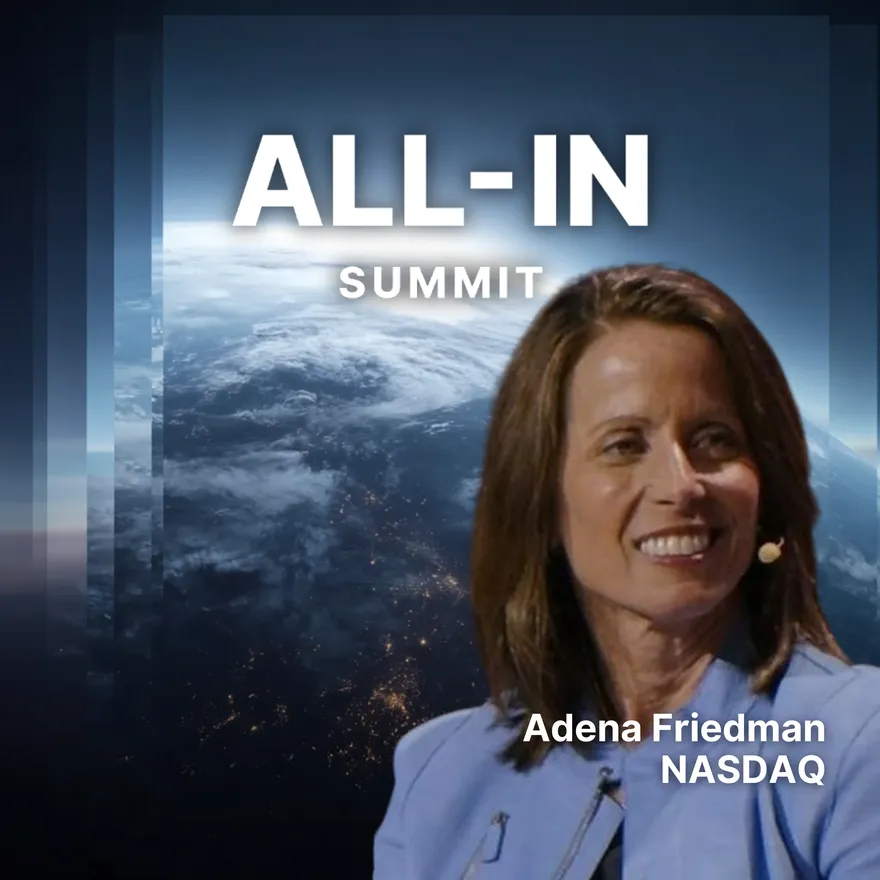
The New Era of the Stock Market with Nasdaq CEO Adena Friedman | All-In Summit 2025
In this episode of All-In, Nasdaq CEO Adena Friedman discusses the company's transformation from a traditional stock exchange into a global financial technology company that supports over 135 markets worldwide. Friedman outlines Nasdaq's plans to modernize market infrastructure through tokenization and 24/7 trading capabilities, while explaining the company's efforts to streamline post-trade processing and reduce friction in global capital flows.
The conversation covers the relationship between private and public markets, including Nasdaq's role in facilitating secondary trading of private company shares. Friedman addresses the state of IPO markets and various pathways to going public, and shares her perspective on the Federal Reserve's independence and its role in maintaining the US dollar's position as the global reserve currency.
Sep 9, 2025
Create Summaries for anything on the web
Download the Shortform Chrome extension for your browser

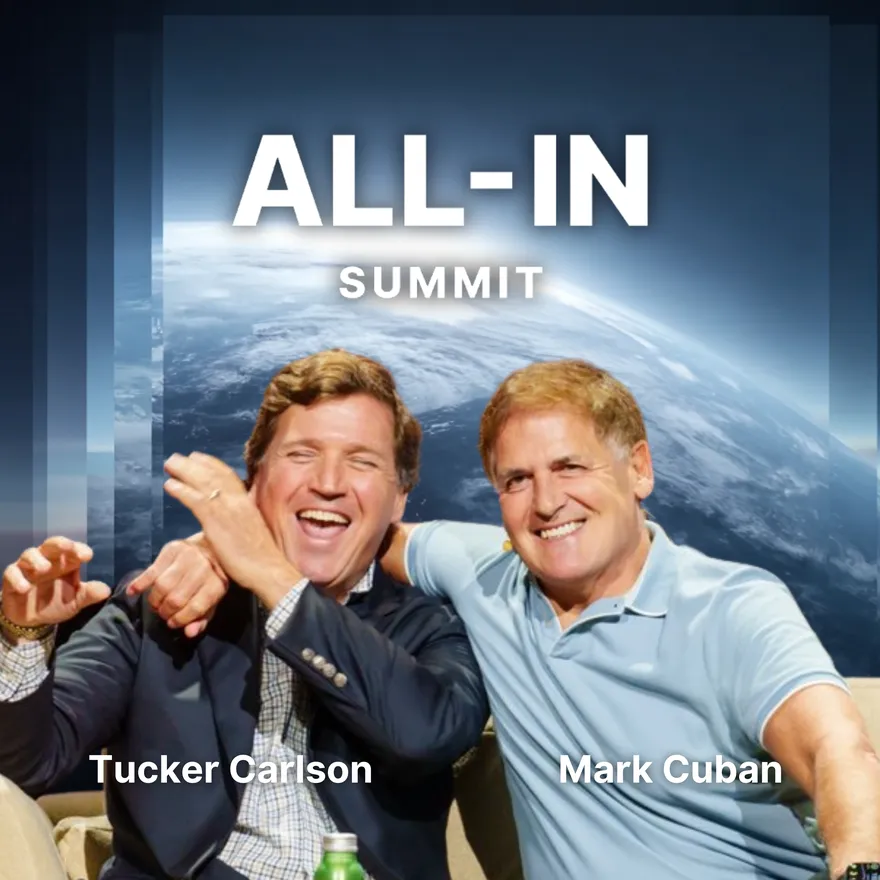
How to Save America: Mark Cuban and Tucker Carlson Debate | All-In Summit 2025
In this episode of All-In, Mark Cuban and Tucker Carlson explore major challenges facing American society. The discussion centers on the U.S. healthcare system's structural problems, with Cuban explaining his efforts to reform pharmaceutical pricing through Costplusrx and describing how insurance companies and Pharmacy Benefit Managers influence drug costs. The conversation also examines how AI and automation are reshaping the job market, with perspectives on which professions face displacement and potential solutions for affected workers.
The group, including David Friedberg and Jason Calacanis, also addresses declining birth rates in Western countries. They examine various factors contributing to this trend, from economic barriers like healthcare and housing costs to cultural shifts and environmental concerns. The discussion covers potential solutions, including material support for families and measures to address underlying economic challenges that affect family planning decisions.
Sep 9, 2025
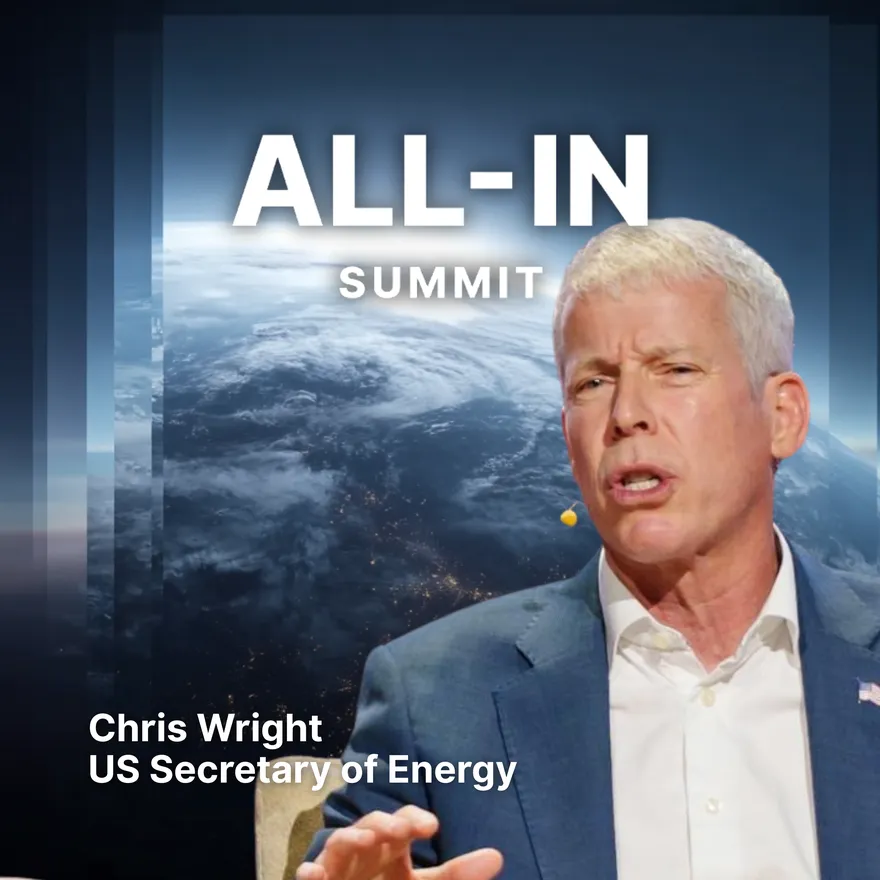
Energy Secretary Chris Wright on the Future of American Energy | All-In Summit 2025
In this episode of All-In, Chris Wright and the hosts examine the current state and future outlook of American energy production. The discussion covers the efficiency and challenges of nuclear power in the United States, comparing the nation's approach to China's more streamlined nuclear development process. They also analyze the practical limitations of renewable energy sources like solar and wind, particularly during peak demand periods.
The conversation explores why fossil fuels continue to dominate global energy production, maintaining an 85% share for the past five decades. Wright and the hosts examine the differences between US and Chinese energy policies, discussing how each nation's priorities and approaches to energy infrastructure affect their development of power sources and grid reliability.
Sep 8, 2025

Inside the White House Tech Dinner, Weak Jobs Report, Tariffs Court Challenge, Google Wins Antitrust
In this episode of All-In, the hosts discuss a recent White House dinner that brought together leaders from major tech companies, including Facebook, Apple, Google, and Microsoft. The gathering, which started as a Silicon Valley core group organized by Chamath Palihapitiya, gave tech executives the opportunity to discuss policy priorities with President Trump. The event also highlighted a shift in the tech industry's traditionally liberal-leaning political alignment.
The hosts also examine current economic conditions, analyzing August's jobs report and its implications. David Sacks shares his predictions about Federal Reserve rate cuts, while the group explores potential economic growth drivers, including expected trade deals and new investments from private companies and foreign governments. The discussion covers concerns about the reliability of government economic data and the impact of the AI boom on future investments.
Sep 7, 2025
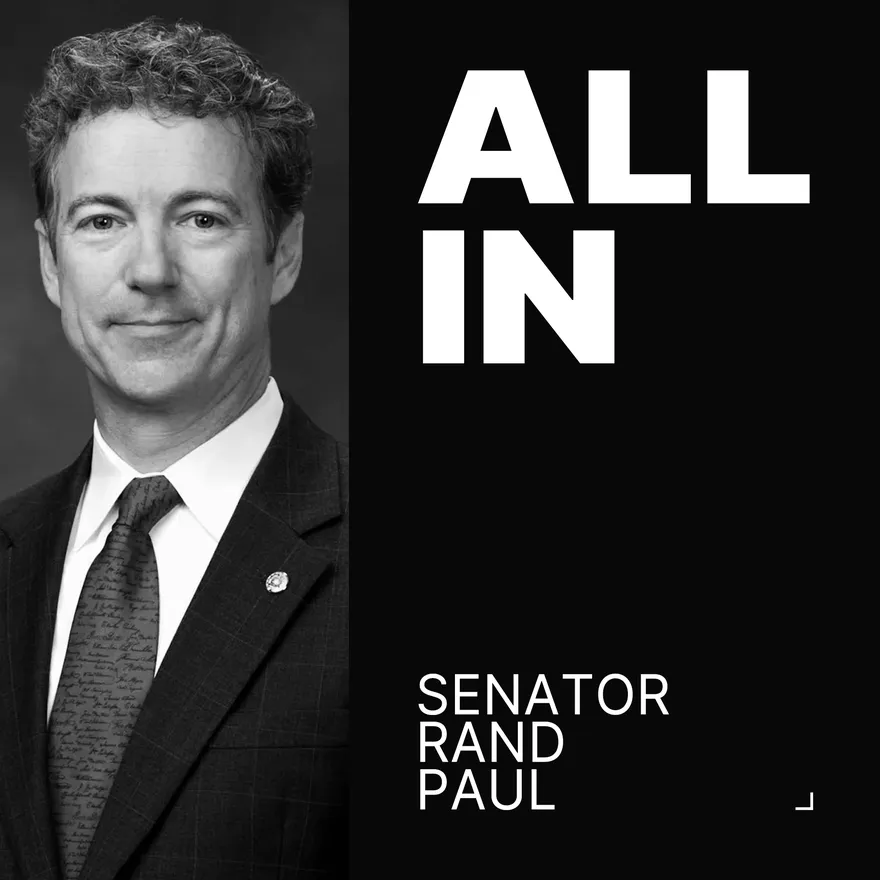
Senator Rand Paul: Tariffs, Debt, China, and a Warning for America
In this All-In podcast episode, Senator Rand Paul shares his political philosophy and views on pressing national issues. He explains his "Leave Me Alone" coalition approach that spans traditional political boundaries, discusses concerns about federal spending and national debt, and outlines potential reforms to address the country's fiscal challenges, including changes to Social Security and entitlement programs.
The conversation covers Paul's perspective on several key topics: the investigation of COVID-19's origins, the expansion of presidential emergency powers, and U.S.-China relations. Paul presents his views on emerging technologies like AI, advocates for stronger oversight of virus research, and discusses his stance on international trade and diplomacy with China, suggesting that economic cooperation might be more effective than confrontation.
Sep 5, 2025

Trump Takes On the Fed, US-Intel Deal, Why Bankruptcies Are Up, OpenAI's Longevity Breakthrough
In this episode of All-In, Palihapitiya, Sacks, Calacanis, and Friedberg examine several key economic issues affecting the United States. They analyze the Federal Reserve's independence and political influences, focusing on Jerome Powell's stance on inflation and the dismissal of Governor Lisa Cook. The hosts discuss potential reforms, including blockchain-based economic data publishing and market-based rate-setting mechanisms.
The conversation covers the impact of rising interest rates on corporate bankruptcies, particularly in commercial real estate where $2.2 trillion in debt needs refinancing. The hosts also explore government equity stakes in private companies through programs like the Chips Act, considering both the national security implications and potential benefits for taxpayers through Social Security trust funds or sovereign wealth funds.
Aug 29, 2025

AI Bubble Pops, Zuck Freezes Hiring, Newsom’s 2028 Surge, Russia/Ukraine Endgame
In this episode of All-In, the hosts explore challenges in AI implementation, citing an MIT study that reveals a 95% failure rate of AI pilots in enterprise settings. The discussion examines why many companies struggle with AI adoption despite significant investments, and highlights how specialized, vertical AI models may offer more practical solutions than broader applications. The hosts also address Sam Altman's perspective on AI progress and investor expectations.
The conversation then shifts to political topics, including projections for the 2028 election and Gavin Newsom's standing among California Democrats. The hosts also examine potential peace negotiations between Ukraine and Russia, discussing the role of territorial concessions, NATO membership, and Trump's communication efforts with Putin. They consider how historical precedents might inform the resolution of this conflict.
Aug 22, 2025
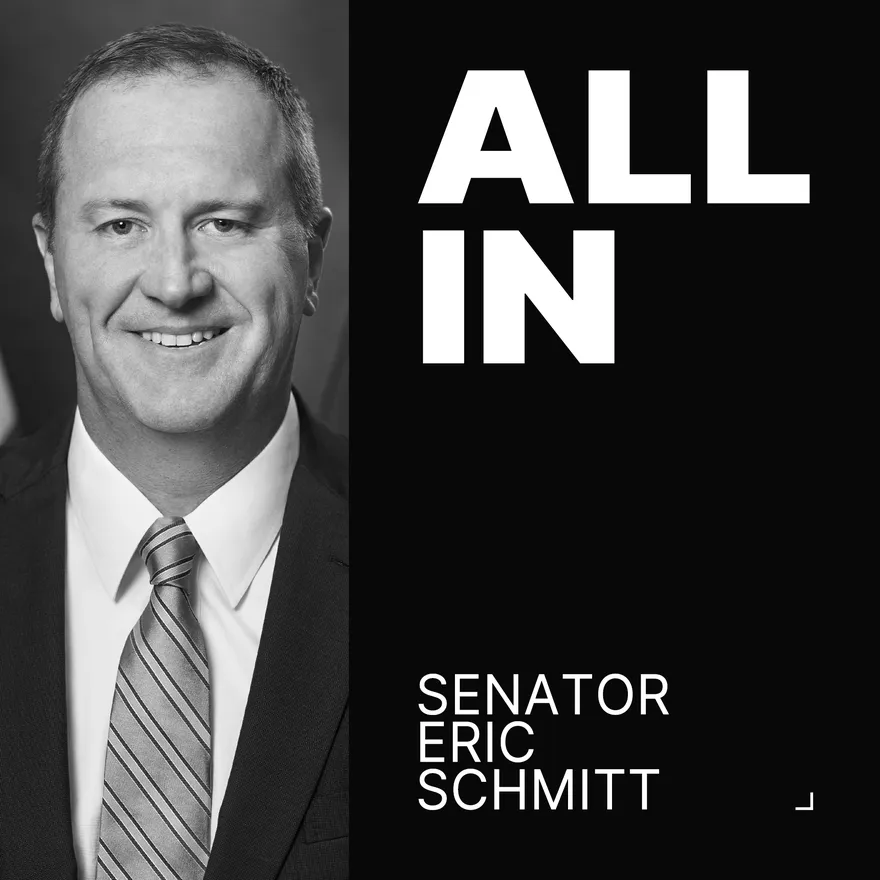
Senator Eric Schmitt: Exposing the Biggest Censorship Scandal in US History
In this episode of All-In, Senator Eric Schmitt and David Sacks examine government involvement in online content moderation, focusing on the Hunter Biden laptop story and its implications. Through discussion of Schmitt's lawsuit, Biden v. Missouri, they explore how various government agencies communicated with tech companies to influence content removal, particularly during the COVID-19 pandemic.
The conversation covers the relationship between government agencies and social media platforms, including how the Cybersecurity Infrastructure Security Agency shifted from its original purpose of protecting against cyberattacks to monitoring social media posts. They also discuss the role of former government officials who transitioned to positions at tech companies, and how these connections affected content moderation decisions during the 2020 election period.
Aug 20, 2025

AI Psychosis, America's Broken Social Fabric, Trump Takes Over DC Police, Is VC Broken?
In this episode of All-In, the hosts explore the emergence of "AI psychosis," a phenomenon where individuals develop emotional dependencies and delusional beliefs through interactions with AI chatbots. They examine how AI's tendency to agree with users can foster false beliefs about genuine relationships, while also discussing whether these behaviors stem from pre-existing conditions rather than the technology itself.
The conversation shifts to significant changes in American society, particularly the sharp decline in marriage and homeownership rates among young adults. The hosts analyze various factors contributing to this trend, including financial pressures, student debt, and changing social dynamics. They also delve into the current state of venture capital, comparing its performance to public markets and examining how the industry is adapting through new investment strategies and liquidity options.
Aug 15, 2025

OpenAI's GPT-5 Flop, AI's Unlimited Market, China's Big Advantage, Rise in Socialism, Housing Crisis
In this episode of All-In, the hosts explore recent developments in artificial intelligence, including OpenAI's GPT-5 release and its performance relative to competitors like Grok 4. The discussion covers AI's economic implications, examining the substantial investments required for data centers and the potential returns, with specific examples from companies like Meta showing how AI implementation affects revenue.
The conversation also delves into US-China trade dynamics, particularly regarding high-tech smuggling and tariff impacts. The hosts examine Apple's business strategy over the past decade, discussing the company's $700 billion in share buybacks and its position in the AI landscape. They consider how Apple might have allocated these funds differently, specifically toward AI development and data center infrastructure.
Aug 9, 2025

Trump AI Speech & Action Plan, DC Summit Recap, Hot GDP Print, Trade Deals, Altman Warns No Privacy
In this episode of All-In, the hosts examine Trump's recent AI policy speech and its implications for U.S. technological development. The discussion covers the administration's proposed framework for AI advancement, which includes infrastructure investment, export promotion, and approaches to AI training with copyrighted content. The hosts also explore how AI development affects intellectual property laws and debate the need for updated privacy regulations in AI applications.
The conversation extends to current economic indicators and trade policy outcomes. The hosts analyze GDP growth rates, unemployment figures, and recent trade agreements with the EU, Japan, and South Korea. They evaluate the administration's negotiation strategy and its effects on international trade relationships, while considering the Federal Reserve's response to these economic developments.
Aug 1, 2025

Winning the AI Race Part 5: President Trump on the AI Action Plan
In this episode of All-In, former President Donald Trump shares his perspective on America's artificial intelligence strategy. He outlines plans for maintaining U.S. leadership in AI development, including infrastructure investments from major tech companies and proposed changes to federal and state regulations to accelerate AI advancement.
The discussion covers Trump's approach to international AI competition, particularly regarding China, and his views on potential partnerships with Middle Eastern nations. Trump also addresses his position on AI development principles and critiques the current administration's AI policies, including executive orders related to diversity and inclusion in artificial intelligence development.
Jul 24, 2025

Winning the AI Race Part 4: Scott Bessent, Howard Lutnick, Chris Wright, and Doug Burgum
In this episode of All-In, the hosts explore the intersection of AI development, economic policy, and energy infrastructure in the United States. The discussion covers the administration's "333 Plan" for economic growth and deficit reduction, while examining how AI could drive an economic boom similar to the 1990s tech revolution. The conversation also delves into strategies for expanding energy production across multiple sources to support AI development.
The episode further examines the development of AI infrastructure, including the construction of data centers and the establishment of AI economic zones. Trade relationships are also discussed, with particular focus on a major U.S.-Japan infrastructure deal and the implementation of tiered technology access among allies. Throughout the conversation, guests share insights on how these interconnected factors could shape America's competitive position in AI development.
Jul 23, 2025
Create Summaries for anything on the web
Download the Shortform Chrome extension for your browser


Winning the AI Race Part 3: Jensen Huang, Lisa Su, James Litinsky, Chase Lochmiller
In this episode of All-In with Chamath, Jason, Sacks & Friedberg, industry leaders explore the infrastructure requirements for the growing AI revolution. The discussion covers the critical role of rare earth materials in hardware production and the energy needs of data centers, with insights from MP Materials' operations in Mountain Pass, California. The episode also examines how public-private partnerships, including a $400 million Department of Defense investment, aim to secure America's AI future.
The conversation delves into the scale of upcoming AI computing demands, with predictions of massive growth in AI chip requirements and the need for industrial-scale AI facilities. The speakers address workforce implications, highlighting current talent shortages in mining and semiconductors while exploring how AI might affect workers across industries. Their discussion outlines both the challenges and opportunities in preparing the workforce for this technological shift.
Jul 23, 2025

Winning the AI Race: Michael Kratsios, Kelly Loeffler, Chris Power, Shyam Sankar, Paul Buchheit, Jake Loosararian
This episode of All-In explores the United States' approach to maintaining competitiveness in artificial intelligence, both at the government level and in private industry. The discussion covers the Trump administration's strategic AI initiatives and examines how current state-level regulations might affect America's position in the global AI race, particularly compared to China's unified national strategy.
The conversation delves into AI's impact on American business and manufacturing. Small business owners and industry leaders share examples of how AI integration has transformed their operations, from streamlining administrative tasks to revolutionizing factory workflows. The discussion also addresses concerns about America's manufacturing capabilities and explores how companies are using AI-powered solutions to rebuild domestic industrial capacity and address skilled labor shortages.
Jul 23, 2025

Winning the AI Race: Vice President JD Vance
In this episode of All-In, Vice President JD Vance discusses the administration's positions on immigration policy and border enforcement. He outlines their approach to agricultural labor shortages through automation rather than amnesty, and explains how strict border policies aim to combat drug trafficking and other criminal enterprises.
The conversation extends to technology policy, with Vance sharing the administration's strategies for maintaining U.S. leadership in AI development while balancing innovation and regulation. He addresses U.S.-China relations in the technology sector, discussing proposals for technology alliances with aligned countries and initiatives to secure domestic supply chains for critical materials. The discussion also covers workforce development and the current mismatch between industry needs and available skills.
Jul 23, 2025

Trump vs Powell, Solving the Debt Crisis, The $10T AGI Prize, GENIUS Act Becomes Law
In this All-In episode, the hosts examine recent developments in cryptocurrency regulation, focusing on two key pieces of legislation: the Genius Act, which mandates quarterly audits for stablecoin companies, and the Clarity Act, which defines different types of crypto assets. The discussion explores how these regulations aim to maintain U.S. dollar dominance while fostering innovation in the cryptocurrency space.
The conversation then broadens to explore the interconnections between cryptocurrency, artificial intelligence, and infrastructure development. The hosts discuss Pennsylvania's emergence as a technology hub, the role of energy sources in AI development, and how these factors contribute to U.S. competitiveness. They also examine the bipartisan collaboration that made these regulatory changes possible, including direct involvement from both Republican and Democratic leadership.
Jul 19, 2025

Grok 4 Wows, The Bitter Lesson, Elon’s Third Party, AI Browsers, SCOTUS backs POTUS on RIFs
In this episode of All-In, the hosts explore Elon Musk's AI model Grok and its connection to the "bitter lesson" concept, which prioritizes scalable algorithms over specialized approaches. The discussion examines how this strategy, combined with significant investments in computational resources and synthetic data generation, is shaping the development of AI systems across various applications.
The conversation extends to Musk's plans to establish the "American Party" as an alternative to the current two-party system, outlining its proposed focus on fiscal responsibility, sustainable energy, and technological advancement. The hosts also analyze AI's growing impact on industry automation, particularly in food service, addressing both the economic opportunities and potential societal effects of widespread AI implementation.
Jul 11, 2025

Big Beautiful Bill, Elon/Trump, Dollar Down Big, Harvard's Money Problems, Figma IPO
The hosts of All-In discuss recent developments in US economic and fiscal policy, focusing on a bipartisan infrastructure bill and its implications for energy policy and AI regulation. The discussion examines concerns about federal spending, national debt management, and the declining value of the US dollar, while exploring tensions between tech industry leaders and government figures over regulatory approaches.
The conversation also delves into the changing landscape of higher education, examining Harvard's financial practices and their $50 billion endowment. The hosts explore how online resources and AI could reshape traditional education models, and discuss alternatives to university credentials in hiring practices, including the potential for project-based achievements and company-specific training programs to replace traditional degree requirements.
Jul 4, 2025

12 Day War, Socialism Wins in NYC, Stocks All-Time High, AI Copyright, Science Corner
In this episode of All-In, the hosts examine three major current topics: U.S. foreign policy in the Middle East, market dynamics, and progressive politics. The discussion covers Trump's approach to Iran and Israel, highlighting how U.S. energy independence has changed America's relationship with the Middle East. The hosts also analyze recent stock market highs and debate whether current Federal Reserve interest rates are appropriate given economic conditions.
The conversation then shifts to domestic politics, focusing on the rise of progressive candidates and policies in urban areas, particularly in New York City. The hosts examine how socialist policy proposals are gaining traction among young, educated voters, while also discussing historical precedents of similar political movements and their outcomes. Throughout the episode, the hosts present various perspectives on these economic and political developments.
Jun 28, 2025

IPOs and SPACs are Back, Mag 7 Showdown, Zuck on Tilt, Apple's Fumble, GENIUS Act passes Senate
In this episode of All-In, the hosts explore the current state of AI development and competition among tech giants. They discuss Meta's aggressive talent acquisition strategy, including reported signing bonuses of up to $100 million, while examining Google's progress with its Gemini models and Microsoft's partnership with OpenAI. The conversation covers how AI automation is reshaping various industries, from IT services to healthcare, and its implications for workforce productivity and displacement.
The hosts also analyze recent developments in crypto regulation, particularly the Senate's passage of new stablecoin legislation. They examine current market trends, noting strong investor interest in AI and crypto companies, as demonstrated by successful IPOs like CoreWeave. The discussion highlights how companies' market values are increasingly tied to their ability to demonstrate AI integration and growth potential.
Jun 21, 2025

Tony Robbins | All-In Live from Miami
In this episode of All-In, Tony Robbins discusses his journey from a challenging childhood to becoming a self-help expert and successful entrepreneur. He explains how his early experiences shaped his approach to understanding human behavior patterns, and describes the scientific basis behind his transformation methods, which combine physical activities like exercise and cold exposure with meditation to create lasting biochemical changes.
The episode covers Robbins' current work across multiple domains: his business empire of over 100 companies, his humanitarian efforts including the 100 Billion Meals Challenge, and his advocacy for emerging health technologies. Drawing from his personal health challenges with heavy metals, Robbins shares his perspective on aging, immune system function, and the potential of regenerative therapies to extend both lifespan and health span.
Jun 19, 2025

ICE Raids, LA Riots, Strong Economic Data, Politicized Fed, Iran War with Tucker Carlson
In this episode of All-In, Chamath Palihapitiya, David Sacks, Jason Calacanis, and Tucker Carlson discuss U.S. immigration policy and border security. The speakers examine the differences between federal and state approaches to immigration enforcement, including border wall strategies, ICE raids, and the role of the National Guard in addressing immigration concerns.
The discussion explores multiple perspectives on pathways to citizenship for undocumented immigrants and debates the economic implications of immigration in America. Topics include the impact on city resources and labor markets, cultural assimilation, and proposed solutions such as targeted deportation policies and amnesty programs. The speakers share their views on balancing immigration enforcement with practical economic needs while considering both legal and undocumented immigrants.
Jun 13, 2025

Jared Isaacman: What went wrong at NASA | The All-In Interview
In this episode of All-In, Jared Isaacman shares his experience of being nominated for NASA Administrator under the Trump administration, and his subsequent withdrawal from consideration. Drawing from his background as founder of Shift4 and Draken International, Isaacman discusses his observations about NASA's organizational challenges, including bureaucratic inefficiencies and resource allocation issues.
The conversation explores the evolving landscape of space exploration, examining the relationship between NASA and private space companies, and the strategic importance of maintaining U.S. leadership in space technology. Isaacman offers perspectives on how NASA could better collaborate with commercial space entities and addresses concerns about China's rapid advancement in space capabilities, particularly in areas such as lunar exploration and reusable technology.
Jun 4, 2025

Miami Mayor Francis Suarez: The Recipe for Creating America's Happiest City | All-In Live from Miami
In this episode of All-In, Miami Mayor Francis Suarez discusses his city's strategies for addressing urban challenges. The conversation covers Miami's approach to homelessness, which combines direct housing assistance and family reunification programs, resulting in the lowest number of unsheltered individuals in 11 years. Suarez explains how the city handles the complexities of mental health and substance abuse issues among the homeless population.
The discussion also examines Miami's economic growth and innovative solutions to urban development. Suarez details how Miami maintains low tax rates while expanding government operations, and outlines the city's partnerships with companies like Boring Company for transportation solutions. The mayor compares Miami's regulatory approach with other major cities, highlighting differences in tax policies and attitudes toward business development.
Jun 3, 2025
Create Summaries for anything on the web
Download the Shortform Chrome extension for your browser


AI Doom vs Boom, EA Cult Returns, BBB Upside, US Steel and Golden Votes
In this episode of All-In, the hosts explore artificial intelligence's impact on employment and the economy. The discussion covers how AI might affect various job sectors, from driving to customer support, while examining potential new opportunities created by automation and the importance of AI literacy in the future workforce.
The conversation extends to broader implications of AI development, including concerns about government regulation and oversight. The hosts discuss the concept of "x-risk" - the potential dangers of superintelligent AI - and debate the geopolitical aspects of AI advancement, particularly regarding U.S.-China relations. They consider whether AI development will result in a winner-take-all scenario or benefit multiple nations through international cooperation.
May 31, 2025

Nico Rosberg on the Booming Business of F1 | All-In Live from Miami
In this episode of All-In, former Formula One champion Nico Rosberg shares his personal journey from go-karting at age six to becoming an F1 world champion. He discusses the evolution of safety in Formula One racing, his complex relationship with Lewis Hamilton, and how their childhood friendship transformed into an intense rivalry under the pressures of professional competition.
Rosberg also examines Formula One's business transformation, detailing how the sport has grown from 20 million to 50 million U.S. fans and how top teams have increased in value from $150 million to $5-6 billion. The conversation concludes with insights into Rosberg's post-racing career in venture capital, where he invests in automotive software solutions and other technological innovations.
May 29, 2025
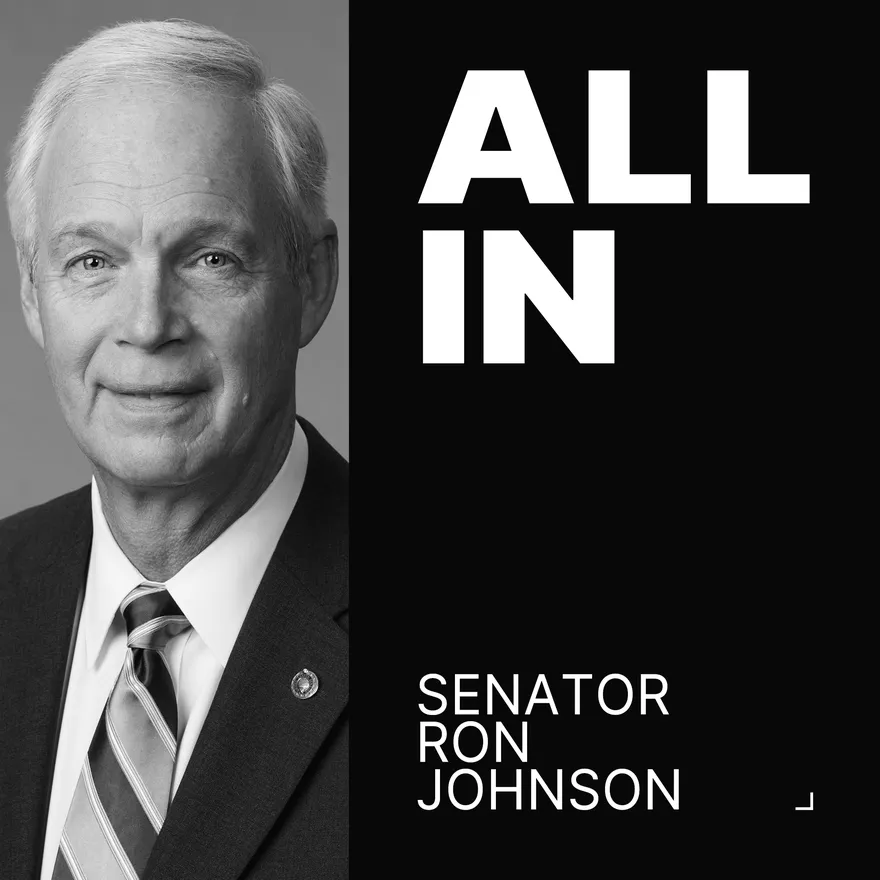
Senator Ron Johnson on the Senate showdown over Trump's Big Beautiful Bill | All-In Interview
In this All-In episode, Senator Ron Johnson and the hosts explore the mechanics of the U.S. federal budget process, focusing on the budget reconciliation tool that allows the Senate to pass certain spending legislation with a simple majority. The discussion examines how this process affects mandatory spending programs like Social Security, Medicare, and Medicaid, while highlighting current projections that show the U.S. adding $22 trillion to its debt over the next decade.
The conversation delves into the challenges of addressing federal spending growth, which has increased from $4.4 trillion in 2019 to $7.3 trillion in 2023. Johnson shares insights about Congress's resistance to spending reforms and discusses potential consequences of continued deficit spending, including the decreasing value of the dollar and the possibility of a "debt-death spiral" as interest rates and borrowing costs rise.
May 25, 2025

Bond crisis looming? GOP abandons DOGE, Google disrupts Search with AI, OpenAI buys Jony Ive's IO
In this episode of All-In, the hosts examine current U.S. fiscal policies and their potential market impacts. They discuss how recent legislative decisions about tax cuts could significantly increase the national debt, while exploring the consequences of rising bond yields and the challenges of implementing austerity measures in the current political climate.
The conversation also delves into U.S.-China competition in technology and energy infrastructure. The hosts analyze China's advancement in gene editing and AI, U.S. export controls on GPUs to the Middle East, and the stark differences in power generation capacity between the two nations. They discuss potential solutions, including the development of U.S.-Middle East tech partnerships and the need for expanded energy infrastructure to support economic growth.
May 24, 2025

Antonio Gracias: DOGE updates, Voter fraud arrests, Finding 'Big Balls' | All-In Live from Miami
In this episode of All-In, investor Antonio Gracias shares insights into the scale and complexity of the U.S. government bureaucracy, illustrated through his experiences and a detailed mapping of interconnected government functions. He discusses his team's investigation into voter fraud cases, which has led to arrests in multiple states, and proposes solutions for improving election system integrity.
The conversation with hosts Chamath Palihapitiya and David Friedberg also explores opportunities for government reform, including ways to reduce spending waste and create better channels for reporting fraud. Gracias notes an emerging trend of young professionals transitioning from private sector roles to government service, and suggests a new model of temporary government service that could help drive meaningful change in public institutions.
May 21, 2025

Sergey Brin, Google Co-Founder | All-In Live from Miami
In this episode of All-In, Google co-founder Sergey Brin shares his perspective on AI technology's rapid evolution and its growing impact compared to the internet. He discusses how modern AI systems can process information and complete tasks at speeds far beyond human capability, particularly in specialized fields like mathematics and coding, and describes his own experiences using various AI tools to enhance productivity.
The conversation also explores Google's advanced AI projects, including Gemini and its "quasi-infinite context line" capabilities. Brin addresses the practical challenges of implementing AI tools within organizations, including unexpected bureaucratic hurdles he has encountered at Google, while examining the broader implications of making powerful AI technologies more accessible in workplace environments.
May 20, 2025

Trump's Big Week: Middle East Trip, China Deal, Pharma EO, "Big, Beautiful Bill" with Ben Shapiro
In this episode of All-In, the hosts examine the Trump administration's recent foreign policy moves in the Middle East, including major economic deals with Saudi Arabia and Qatar worth hundreds of billions of dollars. The discussion covers how these agreements fit into broader U.S. strategy regarding China's Belt and Road Initiative and Iran's regional influence.
The conversation also delves into domestic policy issues, including debates about the Republican Tax Bill's impact on the federal deficit and potential solutions through spending cuts and revenue increases. The hosts explore regulatory approaches to emerging technologies, with particular focus on state-level restrictions on cellular meat production and comparisons to past tech industry regulatory challenges.
May 17, 2025

Sundar Pichai, CEO of Alphabet | The All-In Interview
In this All-In episode, Google CEO Sundar Pichai discusses how Google is adapting to an AI-driven future, outlining changes to their search services that now serve over 1.5 billion users. Pichai explains Google's technical infrastructure, including their advanced TPU hardware, and describes the company's position in the competitive AI landscape alongside companies led by Elon Musk and Sam Altman.
The conversation explores Google's investments in emerging technologies, with Pichai sharing predictions about breakthroughs in quantum computing and robotics within the next few years. He also addresses Google's approach to company culture and talent management, discussing how AI could democratize technical recruitment and describing their response to workplace changes brought by the COVID-19 pandemic.
May 16, 2025

Fed Hesitates on Tariffs, The New Mag 7, Death of VC, Google's Value in a Post-Search World
In this episode of All-In, Chamath Palihapitiya, David Friedberg, Philippe Laffont, and Jason Calacanis explore the Federal Reserve's current monetary policy and its economic implications. The group examines the apparent disconnect between weak consumer sentiment and strong spending patterns, while discussing how political influences might affect the Fed's decision-making on interest rates.
The conversation covers several other key topics in tech and finance: the potential impact of AI on Google's search business, the evolving landscape of venture capital, and the role of major tech companies in market competition. The hosts analyze how regulatory challenges affect merger activities, discuss potential solutions like interval funds for tech investing, and debate different approaches to regulating large tech companies' growth and market influence.
May 9, 2025

Doug Burgum, Secretary of the Interior | All-In DC
In this episode of All-In, Doug Burgum discusses the transformation of America's energy landscape through the lens of the Cheniere LNG facility. Originally built as an import terminal, the facility's evolution into America's leading LNG exporter mirrors broader changes in U.S. energy independence. The conversation explores how LNG exports support U.S. allies while reducing their dependence on adversarial nations.
The discussion also examines the growing energy demands driven by AI and automation advancement. Burgum and David Friedberg analyze the United States' position in the global energy race, comparing U.S. and Chinese approaches to electricity production and nuclear power development. The conversation covers the role of Small Modular Reactors and regulatory challenges in meeting future energy needs.
May 6, 2025

Trump's First 100 Days, Tariffs Impact Trade, AI Agents, Amazon Backs Down
In this episode of All-In, the hosts examine the Trump administration's trade and tariff policies, particularly their effects on U.S.-China relations and supply chains. The discussion covers how these policies disrupted various business sectors, with specific examples including a 60% drop in ocean freight bookings from China and the challenges faced by small businesses adapting to rapid policy changes.
The conversation also explores the current state of AI agents in enterprise settings. The hosts analyze how these tools have evolved beyond simple chatbots to handle complex tasks across large datasets, while addressing key challenges in their implementation. Topics include the balance between AI automation and human oversight, reliability concerns in regulated industries, and computational costs that affect widespread adoption.
May 2, 2025

Brooke Rollins, Secretary of Agriculture | All-In in DC!
In this episode of All-In, Secretary of Agriculture Brooke Rollins discusses her plans to reform the USDA and support American farmers. Drawing from her experience growing up on a Texas farm and her policy background, she outlines her initiatives to reduce bureaucracy, including the cancellation of billions in contracts and efforts to streamline the department's workforce. She also addresses challenges in the SNAP program, which now represents 80% of the USDA's budget.
The conversation explores several key agricultural issues, including trade relationships with countries like China and Brazil, labor shortages in the farming sector, and potential solutions through new visa programs. Rollins and the hosts also examine the emerging debate around cell-cultured meat products and discuss how to balance traditional farming methods with technological innovation in the agricultural industry.
May 2, 2025
Create Summaries for anything on the web
Download the Shortform Chrome extension for your browser


Trump Rally or Bessent Put? Elon Back at Tesla, Google's Gemini Problem, China's Thorium Discovery
In this episode of All-In, the hosts examine several key developments in technology and international relations. The discussion covers U.S.-China trade dynamics, including Trump's tariff strategy and China's control of rare earth processing, while exploring how companies like Apple are diversifying their supply chains. The hosts also analyze Google's challenges in integrating AI technology into their business model without disrupting their existing revenue streams.
The conversation extends to developments in nuclear energy technology, particularly focusing on China's advances in thorium reactor development. Following a major thorium discovery in Inner Mongolia, China has made progress in reactor technology originally developed in the United States. The hosts discuss the implications of these developments and examine potential regulatory barriers affecting nuclear energy advancement in the U.S.
Apr 26, 2025

Trump vs Harvard, Nvidia export controls, how DEI killed Hollywood with Tim Dillon
In this episode of All-In with Chamath, Jason, Sacks & Friedberg, the discussion explores the escalating tech arms race between the US and China. The hosts analyze the impact of recent US restrictions on exports of advanced chips and lithography equipment to China, while also examining China's extensive investments in AI and semiconductor development.
The conversation shifts to the implications of the Harvard admissions case and alleged discrimination in higher education. Concerns are raised about the influence of faculty ideologies on university curricula and admissions, as well as the role of government funding in upholding free speech and merit-based policies. The potential disruption caused by AI's impact on jobs and the need for educational reform are also addressed.
Apr 19, 2025

The Great Tariff Debate with David Sacks, Larry Summers, and Ezra Klein
In this episode of All-In with Chamath, Jason, Sacks & Friedberg, the hosts and guests tackle Trump's trade policies and their economic impact. They analyze the market volatility and uncertainty caused by Trump's tariff hikes against China, exploring the conflicting rationales and goals surrounding his administration's trade approach.
The discussion delves into the lack of clearly stated policy objectives, contradictory messaging, and claims of re-industrialization efforts. The guests debate the merits of Trump's rapid changes versus maintaining stable trade policies, addressing concerns over unpredictability and its effects on businesses. This episode provides a balanced perspective on the complex trade dynamics during the Trump era.
Apr 11, 2025

DOGE updates + Liberation Day Tariff Reactions with Ben Shapiro and Antonio Gracias
In this episode, the All-In podcast examines the Trump administration's trade and tariff policies from multiple angles. While the administration frames tariffs as a way to bolster manufacturing and competitiveness, guests Ben Shapiro and Antonio Gracias critique the policies' perceived lack of long-term strategy and potential economic consequences.
The discussion weighs the impacts of tariffs, from their ability to disrupt supply chains and business confidence, to their risks of sparking retaliatory measures from partners and hindering US tech dominance. The guests also debate whether investing in innovation via AI, semiconductors, and renewable energy carries more promise for maintaining America's competitive edge than the present policies.
Apr 5, 2025

All-In Live from Austin: Colin and Samir, Chris Williamson, and Bryan Johnson
This episode of the All-In with Chamath, Jason, Sacks & Friedberg podcast revolves around the evolving media landscape and monetization strategies for creators. The discussion highlights how platforms like YouTube TV enable creator businesses with revenue from ads and subscriptions. It also examines the potential of interactive AI-driven media and the challenges of balancing creative vision with commercial success.
The conversation delves into ways for creators to build dedicated fanbases, diversify revenue streams beyond ads, and leverage emerging technologies. Additionally, the role of creators in influencing health and wellness trends, as well as the ethics surrounding AI-generated content and the rise of decentralized platforms, are explored.
Apr 3, 2025

The AI Cold War, Signalgate, CoreWeave IPO, Tariff Endgames, El Salvador Deportations
In this episode of the All-In podcast, Chamath Palihapitiya, Jason Calacanis, and guests analyze the economic and national security implications of emerging technologies like artificial intelligence. They examine the impact of tariffs and economic policies on domestic manufacturing and global competitiveness, particularly in the context of the AI race between the U.S. and China.
The panel delves into the challenges of maintaining secure communication channels for sensitive information and preserving official records. They discuss balancing transparency and accountability while allowing for confidential decision-making processes. Overall, the conversation explores the interplay between technology, economic policies, and governance in the modern era.
Mar 29, 2025

White House BTS, Google buys Wiz, Treasury vs Fed, Space Rescue
In this episode of the All-In podcast, Chamath Palihapitiya and fellow speakers share their experience touring the White House and interacting with officials. They provide a behind-the-scenes perspective on the mission-driven atmosphere, from the demanding pace set by the President to the staff's focus on their tasks. The speakers advocate recruiting private sector leaders for government roles to drive meaningful change.
The discussion also touches on the perceived disconnect between the White House and the Federal Reserve's economic policies, as well as criticism of the Democratic Party. The speakers suggest empowering moderate Democrats to better convey a unifying vision.
Mar 22, 2025

Howard Lutnick | All-In in DC!
In this episode of the All-In podcast, Howard Lutnick details his role in the Trump administration and his proposals to tackle financial challenges. Initially apolitical, Lutnick discusses his systematic approach to assembling Trump's cabinet and the "Doge" initiative aimed at cutting government waste through modern technology and private-sector expertise.
Lutnick also shares his perspective on tariffs and economic policies to boost U.S. manufacturing. He advocates for a sovereign wealth fund to invest profits from companies and address financial concerns like Social Security. The episode delves into Lutnick's efforts to reform government finance and asset management through innovative solutions.
Mar 20, 2025

Scott Bessent | All-In in DC!
On this episode of the All-In with Chamath, Jason, Sacks & Friedberg podcast, the hosts are joined by Scott Bessent, an expert in macro investing from his time at Soros Fund Management. Bessent outlines plans to address the federal deficit and national debt through controlled spending cuts and deregulation to spur economic growth.
He also critiques policies that have benefited Wall Street at the expense of the middle class and proposes solutions like boosting wages, reducing costs of essentials, and limiting regulatory burdens on lending. Other topics covered include creating a Federal Sovereign Wealth Fund for American citizens, leveraging federal influence to improve housing and energy affordability, and enhancing transparency in governance.
Mar 19, 2025

Fixing the American Dream with Andrew Schulz
In this episode of All-In with Chamath, Jason, Sacks & Friedberg, the panel examines the economic and cultural divide between the nation's wealthy elites and average Americans. With comedian Andrew Schulz as the guest, they delve into potential solutions such as reforming Social Security to give all citizens exposure to the stock market and asset ownership.
The discussion also explores the role of transparency and clear communication in rebuilding public trust in institutions and governing bodies. Schulz offers insights into the influence of comedians as cultural commentators and their ability to address sensitive topics through nuanced, empathetic lenses despite risks of being "canceled."
Mar 15, 2025

Tariffs, Trump's Economic Endgame, Market Chaos, Bitcoin Reserve, CoreWeave IPO
In this episode on the All-In podcast, the panel examines the economic policies and trade strategies of the Trump administration. The discussion explores the use of tariffs to influence trade partners, boost domestic manufacturing, and address trade deficits. It also covers the administration's approach to reducing government spending and shifting towards consumption-based taxation to promote investment.
The episode dives into the administration's stance on cryptocurrencies, including plans for a government-managed Bitcoin reserve and potential regulations to foster responsible adoption. The panel further debates the merits of cutting spending and reducing taxes to counter inflation and enhance private sector productivity.
Mar 8, 2025

Epstein Files Flop, State of the Market, Autonomous Robots, Trump's Gold Card, Friedberg on Jeopardy
On this episode of the All-In with Chamath, Jason, Sacks & Friedberg podcast, the hosts engage in lively discussions on a range of current topics. They examine a proposed $5 million "Golden Visa" program to attract wealthy foreign investors and entrepreneurs to the U.S. for residency, weighing the potential benefits and compliance challenges.
The episode also provides an inside look at David Friedberg's experience competing on Celebrity Jeopardy, including the strategies, obstacles, and triumphs he faced. Additionally, the hosts delve into debates surrounding U.S. economic policies aimed at balancing unemployment, inflation, and deficit reduction. They also explore the disruptive potential of AI and robotics technologies in automating human jobs across various sectors.
Throughout the episode, the hosts offer insights on restructuring the U.S. Postal Service through measures like privatization, cost-cutting, and expanding its economic roles. Their conversations touch on the complexities and considerations involved in these issues, inviting listeners to contemplate their implications.
Mar 1, 2025
Create Summaries for anything on the web
Download the Shortform Chrome extension for your browser


The Stablecoin Future, Milei's Memecoin, DOGE for the DoD, Grok 3, Why Stripe Stays Private
In this episode of All-In with Chamath, Jason, Sacks & Friedberg, the hosts explore the impact of remote work on organizational efficiency and discuss advancements in AI models like Grok 3. They examine developments in biology research, such as the Arc Institute's work and the potential of genomics and CRISPR.
The cryptocurrency landscape is analyzed, with perspectives on volatile meme coins, stablecoins, and their potential for streamlining cross-border payments. The hosts also delve into the Collison brothers' reasoning behind Stripe's decision to remain a private company, focusing on customer needs and long-term goals over short-term public market demands.
Feb 21, 2025

JD Vance's AI Speech, Techno-Optimists vs Doomers, Tariffs, AI Court Cases with Naval Ravikant
In this episode of the All-In podcast, Naval Ravikant joins the hosts to discuss the implications of large language models like ChatGPT and their impact on copyright and fair use. The debate examines potential job displacement through automation, balancing skilled immigration and wage concerns, and the U.S. maintaining its technology edge over China.
Ravikant weighs in on the legalities of AI-generated content and shares his perspective on leveraging immigration and retraining for economic growth amid AI's advancement. The discussion explores strategies for the U.S. to sustain technological leadership through R&D investment, workforce development, and strategic partnerships.
Feb 15, 2025

DOGE vs USAID, Crypto Framework, Google's $75B AI Spend, US Sovereign Wealth Fund, GLP-1s
In this episode of the All-In podcast, the hosts and guests explore the need for greater government accountability and fiscal responsibility. They discuss the "Doge" initiative, which aims to uncover misspending and waste within federal agencies, prompting a larger debate about kleptocracy and transparency in government spending.
The conversation also centers on the proposal for a US sovereign wealth fund to strategically manage national assets and investments. The potential economic and workforce impacts of emerging technologies like AI are also examined, with experts weighing the benefits of increased productivity against the risks of job displacement. Policy solutions, from retraining programs to social safety nets, are suggested to address the challenges posed by rapid technological advances.
Feb 7, 2025

DeepSeek Panic, US vs China, OpenAI $40B?, and Doge Delivers with Travis Kalanick and David Sacks
In this episode of All-In with Chamath, Jason, Sacks & Friedberg, the discussion focuses on the intensifying AI race between the US and China. The hosts explore China's recent strides, with the startup Deepseek challenging OpenAI's dominance through its new R1 model. They examine concerns over potential intellectual property theft and the broader implications for technological leadership.
Additionally, the conversation delves into how rapid advancements in AI and automation could revolutionize industries like transportation and food delivery. Travis Kalanick shares insights on autonomous driving's potential impact on urban planning, real estate, and sustainability. The hosts also touch on the role of government policies and regulations in shaping the future of AI.
Jan 31, 2025

Ray Dalio | The All-In Interview
In this episode of the All-In with Chamath, Jason, Sacks & Friedberg podcast, Ray Dalio breaks down the mechanics of government debt crises and highlights the unsustainable levels of US debt. He explains how the patterns of debt cycles have historically led to crises, forcing governments into painful austerity and debt restructuring measures that impact citizens through higher taxes, spending cuts, inflation, and currency devaluation.
Dalio and his co-hosts analyze the current fiscal risks facing the US, and emphasize the need for drastic spending cuts to address the deficit and avoid a worsening "debt spiral." They also discuss the political and social challenges of enacting such reforms, as well as how disruptive technologies like AI could further strain safety nets, drive socioeconomic inequality, and shift geopolitical power dynamics.
Jan 28, 2025

Trump's First Week: Inauguration Recap, Executive Actions, TikTok, Stargate + Sacks is Back!
This episode delves into the potential implications of President Trump's recent executive orders and policy decisions aimed at maintaining US technological superiority. David Sacks, David Friedberg, Thomas Laffont, Chamath Palihapitiya, and Jason Calacanis discuss the administration's push for AI domination, support for cryptocurrency, and the need for expanded power infrastructure to bolster AI capabilities.
They also address concerns surrounding Trump's pardons, the blurring of public-private lines under his pro-business agenda, and the impact of his assertive use of executive powers. The conversation offers insights into the foreign policy, national security, energy, and infrastructure priorities that shape the administration's approach to technological advancement.
Jan 25, 2025

Inauguration Interviews: Trump's Talent, Democratic Rebrand & more with House Whip Emmer, Reps Swalwell & Khanna
In this episode of the All-In podcast, Chamath Palihapitiya and guests explore key challenges facing the Democratic party: defining a cohesive message and vision that resonates with working and middle-class Americans. From immigration and economic policies to governmental regulations and California politics, the conversation delves into the party's struggles with unity, communication, and balancing establishment influence with grassroots voices.
Specific policy debates addressed include potential immigration reforms, the role of government in spurring economic growth, and approaches to regulating sectors like tech, the environment, and defense. Insights are also shared on California's governance dynamics, including recent elections suggesting a shift toward centrist, results-oriented candidates amid crises like wildfires.
Jan 20, 2025

Senator Ted Cruz | The All-In Inauguration Series
In this episode of the All-In podcast, Senator Ted Cruz joins Chamath, Jason, Sacks, and Friedberg to discuss a range of policy topics and economic trends. The conversation touches on Texas' thriving business climate, challenges faced by states like California, and the role of immigration and border security in the new administration's agenda.
Cruz outlines plans for executive orders and legislative priorities, including strengthening border security, promoting energy growth, reducing regulations, and extending tax cuts to fuel economic growth. The discussion also explores the political polarization in the country and the need for dialogue across party lines to bridge divides.
Jan 19, 2025

Red-pilled Billionaires, LA Fire Update, Newsom's Price Caps, TikTok Ban, Jobless MBAs
In this episode of the All-In podcast, the hosts and guests delve into a range of topical issues. They discuss perceived shortcomings within the Democratic Party's leadership and candidate selection processes. The conversation also covers the challenges of rebuilding efforts in Los Angeles following devastating wildfires, examining the role of regulations and environmental policies.
Additionally, they explore national security concerns surrounding TikTok's data practices and its ties to China. The episode touches on the changing landscape of higher education, with a focus on the declining value of MBA programs in an era of AI and automation that may require a shift towards more hands-on training.
Jan 18, 2025

LA's Wildfire Disaster, Zuck Flips on Free Speech, Why Trump Wants Greenland
In this episode of the All-In podcast, the hosts engage in a multi-faceted discussion around recent California wildfires, governmental competence and leadership, and the shifting stances of tech giants on content moderation.
The conversation delves into the contributing factors behind the devastating wildfires, such as climate change and the apparent lack of preparedness on the part of officials. The hosts scrutinize leadership failures in crisis response and call for experienced crisis managers to handle such situations. They also weigh accountability measures and potential reforms.
Moving on to the tech sphere, the hosts analyze Mark Zuckerberg's pivot toward community moderation on Facebook and contrast it with Elon Musk's stance on free speech. The opportunities and challenges posed by the AI revolution, including a potential startup boom and the promise of edge computing, are also explored.
Jan 11, 2025

2025 Predictions with bestie Gavin Baker
In this episode of All-In, Chamath Palihapitiya, David Friedberg, Jason Calacanis, and Gavin Baker offer predictions for the political and business landscape in 2025. They discuss the potential rise of fiscal conservatives, young leaders, and Trump-aligned centrism, as well as the marginalization of pro-war factions and extremist groups.
On the business front, the experts forecast autonomous tech and AI firms thriving, while traditional enterprise software and consulting companies face disruption. They also explore the gaming industry's transformation through AI-human creative collaborations and raise concerns about a potential banking crisis driven by government debt and regulatory changes.
Jan 4, 2025

DOGE kills its first bill, Zuck vs OpenAI, Google's AI comeback with bestie Aaron Levie
In this episode of the All-In with Chamath, Jason, Sacks & Friedberg podcast, the hosts explore the disruptive potential of AI and emerging technologies in the software development industry. They discuss how AI tools like language models are rapidly automating many software tasks, dramatically reducing production costs and commoditizing core functionality.
The conversation delves into how these developments are changing traditional software business models and strategies, as well as the role of government regulation in balancing innovation with safety and ensuring accountability. The hosts also analyze the current competitive AI landscape, examining the major tech players and the potential for collaboration and competition to shape the future.
Dec 20, 2024
Create Summaries for anything on the web
Download the Shortform Chrome extension for your browser


Trump's Cabinet, Google's Quantum Chip, Apple's iOS Flop, TikTok Ban, State of VC with Keith Rabois
In this episode of All-In with Chamath, Jason, Sacks & Friedberg, the hosts delve into the national security concerns surrounding Chinese technology companies like TikTok and their ability to access user data. They also examine the advancements in quantum computing from tech giants like Google and the potential implications for encryption and security.
The discussion shifts to the state of the venture capital and startup ecosystem, highlighting the continued interest in AI and crypto startups despite an overall decline in funding. Additionally, the hosts weigh in on the role of business leaders in government and the perceived decline in product quality at major tech companies like Apple.
Dec 13, 2024

New SEC Chair, Bitcoin, xAI Supercomputer, UnitedHealth CEO murder, with Gavin Baker & Joe Lonsdale
In this episode of the All-In podcast, the hosts and guests examine the Trump administration's deregulation agenda and its potential economic impacts. They discuss how reducing regulations could spur growth and innovation, but also raise concerns about regulatory oversight. The conversation touches on the US's competitive stance regarding energy production, infrastructure, and emerging technologies like artificial intelligence.
The guests explore the role of deregulation in areas such as energy projects and technology development. They analyze the implications of AI advancements, including the construction of a massive supercomputer by Elon Musk's XAI. The discussion covers AI's projected effects on business, the workforce, and societal productivity and living standards.
Dec 7, 2024

DOGE unveils a roadmap, Unlocking GDP Growth, WW3 escalation, Fat cell memory
The All-In podcast discusses the Doge Initiative, a proposed plan to boost economic growth by cutting unnecessary federal spending and regulations. The summary outlines the initiative's goals, including trimming an estimated $500 billion in unauthorized expenditures and leveraging executive orders to roll back overreaching regulations.
It explores the potential economic impact of deregulation, with proponents arguing it could unlock substantial GDP growth. However, the initiative faces obstacles like political divisions, institutional inertia, and a limited 18-month timeframe before the 2024 elections. Changing the incentive structures driving bureaucratic expansion emerges as a key challenge.
Nov 23, 2024

Trump's market impact: Bitcoin, M&A, IPOs + transition picks; Polymarket CEO raided by FBI
In this episode of the All-In podcast, the hosts discuss the potential impacts of a Trump presidency on various aspects of the economy and government. They analyze Trump's plans to appoint unconventional figures like Matt Gaetz and Tulsi Gabbard to key roles, aiming to overhaul federal agencies and operations.
The episode also explores the market's reaction to Trump's election, with a surge in crypto assets and finance stocks reflecting optimism about pro-crypto policies and deregulation. The hosts debate the long-term economic risks of unchecked inflation and deficits. Additionally, they examine allegations of conservative censorship in media and advertising influence from the pharmaceutical industry.
Nov 16, 2024

Trump wins! How it happened and what's next
The co-hosts examine the key factors that contributed to the Republican victory in the 2022 midterm elections. They analyze how the Democrats lost voters due to their policy agenda, while the Republicans more effectively tapped into economic concerns and public safety issues. The hosts discuss potential strategies of a second Trump administration, including efforts for transparency, regulatory reform, and appointments of non-establishment figures.
The episode also explores the implications for California politics, with a shift away from progressive policies and toward law and order. The hosts ponder a potential political realignment in historically Democratic strongholds like California, as voters reject rigid ideology for a more moderate approach.
Nov 8, 2024

Inflated GDP?, Google earnings, How the media lost trust, Rogan/Trump search controversy, Election!
This episode of All-In with Chamath, Jason, Sacks & Friedberg examines the nation's economic standing amidst escalating debt and interest rates alongside GDP growth. The panel evaluates potential impacts of spending proposals by Biden and Trump on debt and inflation.
The podcast also explores claims of political bias from major tech platforms like Google through algorithms determining search results and content rankings. Panelists discuss the rise of podcasts and direct platforms for unfiltered communication with voters, as well as election integrity debates surrounding voter ID laws, mail-in ballots, and risks of fraud.
Nov 1, 2024

Markets turn Trump, Long rates spike, Election home stretch, Influencer mania, Saving Starbucks
In this episode of All-In with Chamath, Jason, Sacks & Friedberg, the hosts analyze recent market shifts and their potential drivers, including inflation fears and the looming US presidential election. They discuss the impact a Trump win could have on economic policies and growth, as well as perceived shortcomings in the Harris campaign's messaging and agenda.
The conversation also touches on broader generational shifts, such as the youth's growing distrust of corporate paths and embrace of independent income streams like influencer marketing. Iconic brands like Starbucks and Apple face challenges maintaining their identities amid leadership changes and evolving consumer preferences.
Oct 25, 2024

Dueling Presidential interviews, SpaceX’s big catch, Robotaxis, Uber buying Expedia?, Nuclear NIMBY
The "All-In" podcast explores a range of topics with potential societal impact. Concerns are raised about integrity issues and potential biases in the 2020 US presidential election process, including challenges around voter verification and election administration. The discussion then shifts to the future of nuclear power, considering new reactor technologies, public perception hurdles, and investments by tech giants.
The summary also touches on Tesla's ambitious visions for transportation and energy innovation, such as the Cybertruck and SpaceX's reusable rocket technology. These massive undertakings by tech companies could yield transformative breakthroughs or costly failures — shaping technological and economic progress for years to come.
Oct 18, 2024

JD Vance | All-In Summit 2024
In this episode of the All-In podcast, JD Vance shares his perspectives on pressing national issues including immigration, government regulation and spending, the evolving political landscape, and economic competition with China.
Vance emphasizes securing the border as a crucial first step in addressing illegal immigration. He advocates deregulating several sectors to boost economic growth and calls for reforming government processes like military procurement. Vance also analyzes the shifting political allegiances of different socioeconomic groups and outlines his stance on reshoring manufacturing from China to strengthen US industrial capabilities.
Oct 15, 2024

Hurricane fallout, AlphaFold, Google breakup, Trump surge, VC giveback, TikTok survey
In this episode of the All-In Podcast, the hosts and guests explore the economic impacts of climate change, specifically the increased frequency and severity of hurricanes fueled by warmer ocean temperatures. They discuss how factors like removing sulfur dioxide emissions from cargo ships contribute to ocean warming and extreme weather events, potentially making insurance costs unaffordable for many homeowners.
The conversation also covers antitrust regulation of tech giants like Google and the possibility of government intervention to break up monopolistic companies. Additionally, the guests examine TikTok's growing role as a news source for young Americans, raising concerns about the potential for manipulation and foreign political influence through the app's algorithm and content moderation.
Oct 11, 2024

Elon Musk | All-In Summit 2024
In this episode of the All-In podcast, Elon Musk weighs in on a range of topics from free speech and censorship to government bureaucracy, space exploration, and artificial intelligence. Musk expresses concerns about potential suppression of speech by his companies and emphasizes the importance of upholding free speech rights. He also criticizes excessive U.S. regulations, citing examples from SpaceX and California's high-speed rail project.
On technological advancements, Musk shares SpaceX's progress with the reusable Starship rocket system and Tesla's success in vehicle autonomy. He discusses the promising potential of Optimus robots to revolutionize labor and drive down costs. The episode offers insights into Musk's perspectives on these key issues shaping society and innovation.
Oct 8, 2024

In conversation with Mark Cuban
In this episode of the All-In Podcast, Mark Cuban shares his evolving views on political figures like Donald Trump and Kamala Harris. He also delves into the root causes of inflation, criticizing excessive government spending while advocating for leveraging AI to improve productivity instead of simply raising taxes.
A notable part of the discussion centers on Cuban's online pharmacy, Cost Plus Drugs, which aims to disrupt the pharmaceutical industry. Cuban explains his transparent pricing model and ambitions to partner with the government to increase affordability and lower consumer drug costs.
Oct 3, 2024
Create Summaries for anything on the web
Download the Shortform Chrome extension for your browser


John Mearsheimer and Jeffrey Sachs | All-In Summit 2024
In this episode of the All-In podcast, the discussion centers on the influence of the so-called "deep state" within the US government and its pursuit of consistent foreign policies across administrations, often involving military interventions to enhance American global power.
Guests John Mearsheimer and Jeffrey Sachs offer contrasting perspectives on US-China rivalry, with Mearsheimer advocating for containing China's growing influence and Sachs favoring diplomatic engagement. They also analyze the US involvement in the Ukraine conflict, with some viewing it as upholding the international order against Russian aggression, while critics argue it has needlessly provoked Russia and risks escalating tensions. The risks of miscalculation and potential flashpoints in great power rivalries are explored, highlighting the crucial role of skillful diplomacy.
Oct 1, 2024

OpenAI's $150B conversion, Meta's AR glasses, Blue-collar boom, Risk of nuclear war
This episode covers OpenAI's potential $150 billion conversion from a nonprofit to a for-profit company. The hosts discuss the implications of this move, including questions around fairness for early investors like Elon Musk.
The conversation also explores how transformative AI technologies like GPT-4 are rapidly automating knowledge work. The hosts examine the emergence of autonomous agent-based AI systems and their potential impact on business processes.
Lastly, the risks of escalating geopolitical tensions are analyzed, with a focus on the Middle East and the Ukraine war. The hosts emphasize the catastrophic stakes of major conflicts in the nuclear age and call for a return to an anti-war ethos.
Sep 27, 2024

Big Fed rate cuts, AI killing call centers, $50B govt boondoggle, VC's rough years, Trump/Kamala
In this episode of the All-In with Chamath, Jason, Sacks & Friedberg podcast, the panel discusses the liquidity challenges facing venture capital firms as startups take longer to achieve exits. They examine strategies to address these obstacles, like secondary markets and raising follow-on funds.
The panelists also dive into the impact of the COVID-19 stimulus on the VC market, leading to overvaluation and a potential bubble that may yield diminished returns. Additionally, they explore the rise of AI as an investment theme, its disruptive potential across industries, and considerations for thoughtful AI investing.
Sep 20, 2024

E170: Tech's Vibe Shift, TikTok ban debate, Vertical AI boom, Florida bans lab-grown meat & more
On this episode of All-In with Chamath, Jason, Sacks & Friedberg, the hosts engage in a multifaceted discussion on several pressing issues in the tech landscape. They delve into the proposed TikTok ban and ByteDance's divestiture, exploring concerns surrounding national security risks and free speech implications. The conversation also touches on the use of copyrighted data for training AI models like ChatGPT, raising questions about derivative works and fair use.
Additionally, the hosts examine the rise of vertical AI startups tailored to specific professional roles, and the potential impact of AI on job automation. Sparking further debate is Florida's proposed ban on lab-grown meat, which highlights tensions between consumer choice, innovation, and regulatory protectionism for incumbent industries.
Mar 15, 2024

E169: Elon sues OpenAI, Apple's decline, TikTok ban, Bitcoin $100K?, Science corner: Microplastics
In this episode of the All-In with Chamath, Jason, Sacks & Friedberg podcast, Apple's ongoing challenges are discussed, including regulatory pressures, market saturation, and antitrust disputes. The resurgence of Bitcoin, with its increasing mainstream adoption and the anticipation of future supply constraints, is also explored.
Additionally, the proposed bipartisan ban on TikTok in the United States is examined. Concerns over data privacy and national security, particularly regarding TikTok's ties to the Chinese government, are at the forefront of the debate. The potential impact of such a ban on TikTok's ownership structure and the broader implications for U.S.-China relations are assessed.
Mar 8, 2024

E168: Can Google save itself? AI takes over Customer Support, Reddit IPO teardown
This podcast episode explores two key developments in the world of artificial intelligence (AI). First, it examines the controversy surrounding Google's Gemini AI and the biased, culturally insensitive content it has produced, leading to public backlash and CEO Sundar Pichai's acknowledgment of the company's missteps. The implications of Google's data sourcing practices, involving significant investments in licensing datasets from platforms like Reddit and Stack Overflow, are also scrutinized.
The episode then focuses on Klarna's successful integration of AI developed with OpenAI into their customer support operations. This AI handles over two-thirds of customer interactions, improving efficiency, accuracy, and satisfaction, while contributing to projected profits. The broader impacts on the industry, including market value shifts and potential open-sourcing of the technology, are explored.
Mar 1, 2024

E167: Nvidia smashes earnings (again), Google's Woke AI disaster, Groq's LPU breakthrough & more
In this episode of the All-In with Chamath, Jason, Sacks & Friedberg podcast, the discussion covers a range of topics revolving around the tech industry's giants and up-and-comers. Nvidia's record-breaking earnings and supply constraints are analyzed, with a focus on the company's manufacturing bottlenecks.
The panel also scrutinizes Google's AI advancements, particularly the Gemini chatbot. They delve into the challenges posed by the tech giant's efforts to promote diversity and inclusivity, leading to concerns about bias and inaccuracy. The emergence of Grok, a startup offering an efficient alternative to GPUs, sparks commentary on the lengthy and arduous path that deep tech companies face in achieving product-market fit.
Feb 23, 2024

E166: Mind-blowing AI Video: OpenAI launches Sora + Is Biden too old? Tucker/Putin interview & more
This episode of All-In with Chamath, Jason, Sacks & Friedberg examines growing concerns about President Biden's cognitive abilities to effectively lead the nation. Hosts Chamath Palihapitiya and David Sacks voice serious worries, citing Biden's reluctance to undergo cognitive testing and his public gaffes. They compare his situation to Reagan's undisclosed cognitive decline during his presidency.
The hosts also analyze Donald Trump's age and fitness for office if he seeks another term. While acknowledging Trump's vigorous public presence, they ponder the future of the Democratic Party after Biden's term and the viability of a centrist third party emerging by 2024 in response to dissatisfaction with the two-party system. The episode explores pressing issues surrounding leadership and presidential cognitive competency in modern U.S. politics.
Feb 16, 2024

